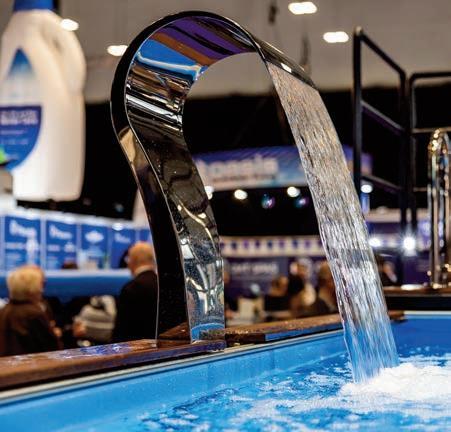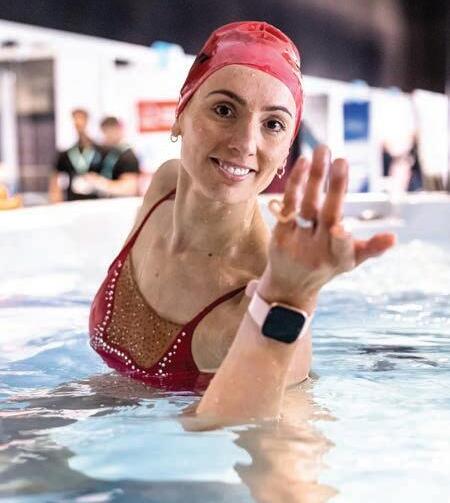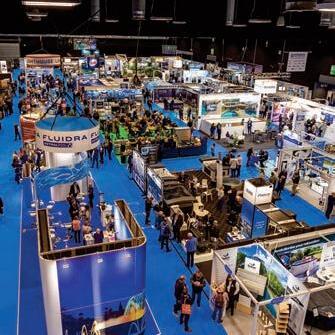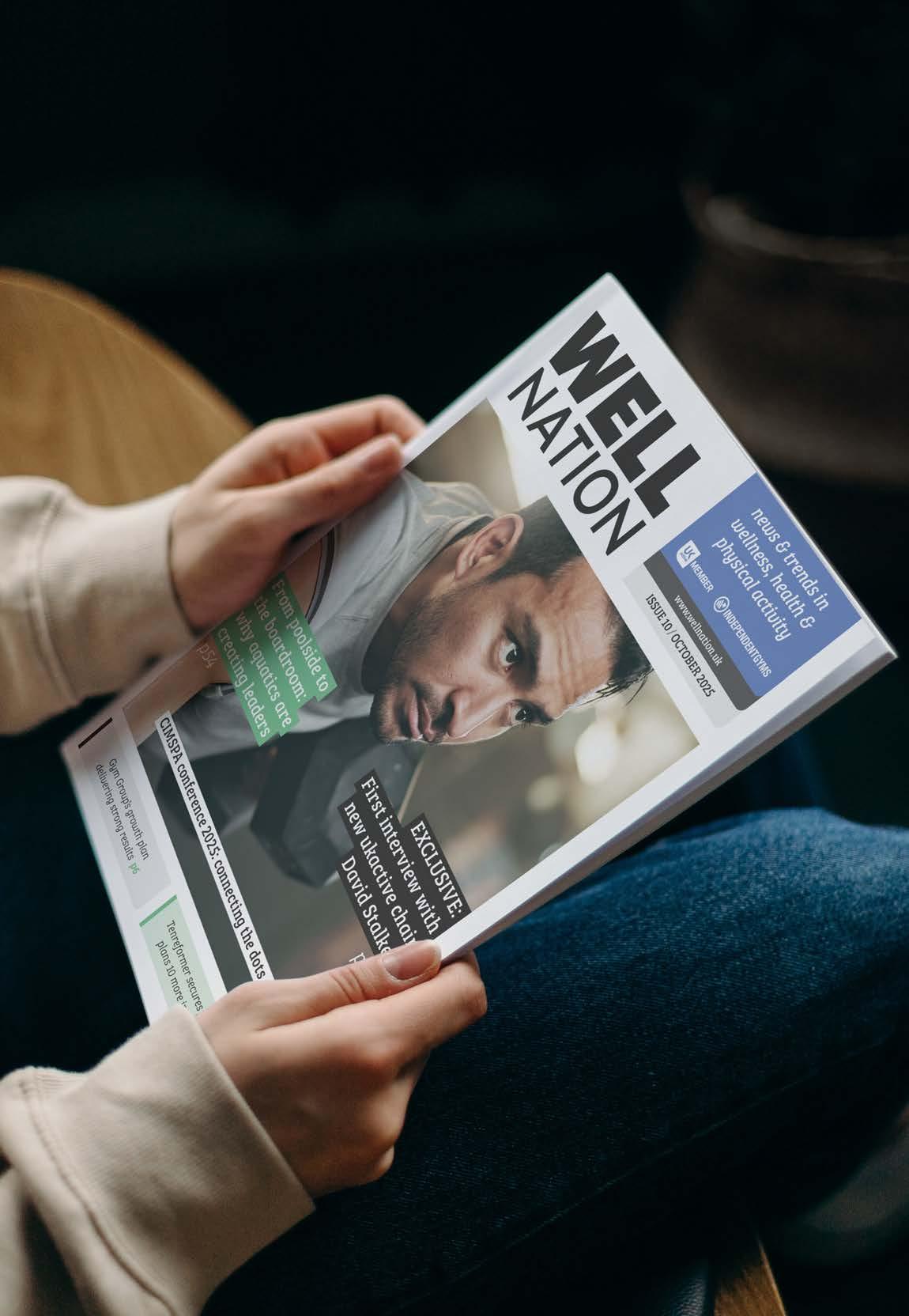






In an industry where cost is often the focus, Active IQ stands apart by delivering more - more quality, more support, more value. We know that price matters, but when it comes to qualifications, reliability, and long-term success, quality is non-negotiable.
That’s why we offer:
Industry-leading qualifications – Designed with employers to meet workforce demands
Comprehensive support – A dedicated team invested in your success
Added value – Free CPD, FitPro membership with eLearning purchases, and extra resources at no cost
A trusted partner – Transparent pricing, no hidden fees, and a gold-standard reputation.

Find out more
Why settle for less?
Begin with better. Choose Active IQ.
Active IQ - where you get more… more quality, more support, more value.
Offer
Extensive tutor and learner resources
One annual fee - Transparent pricing with no hidden fees
No charge for EV visits and sampling
Online learning platform with eLearning, marketing support and eClinics
Talent match service
High quality manuals
Dedicated External Verifier
Dedicated Customer Service Representative
Business consultancy to support growth of your business

Other Awarding Organisations
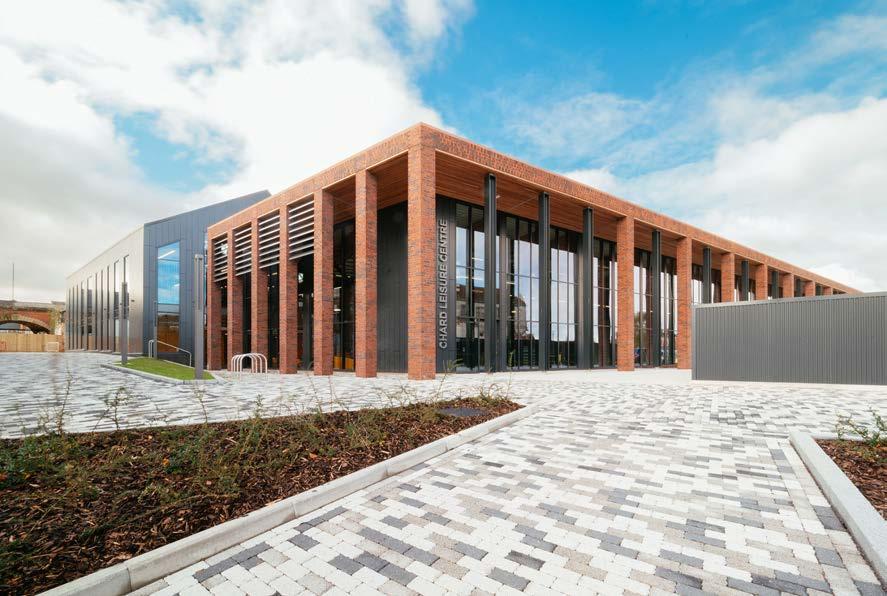
285+ completed projects
81% of clients choose us for further projects
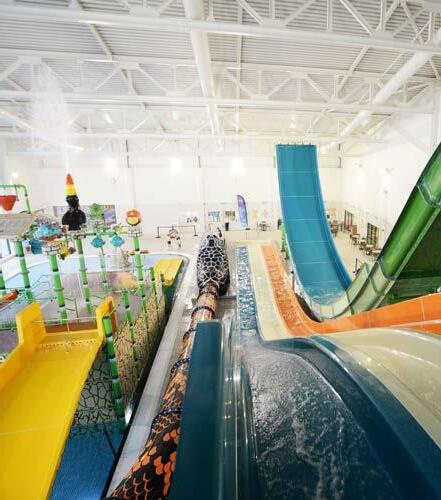
£465m+ investment in local authority leisure
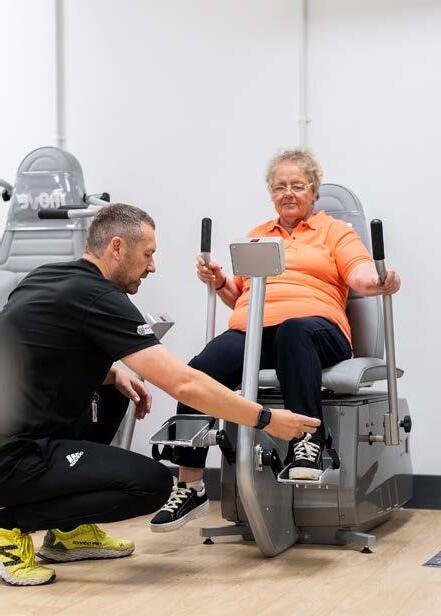
development partner, with over 25 years’ experience transforming leisure facilities for local authorities.


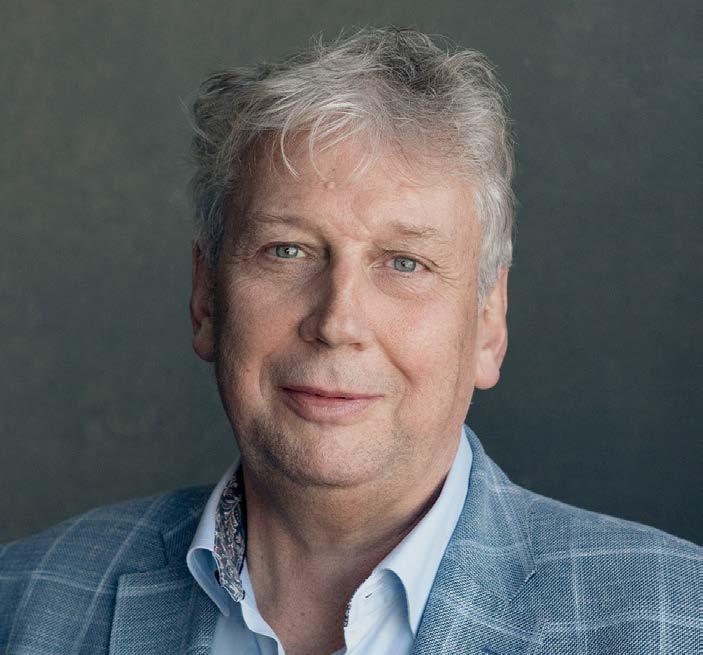
David Stalker has been named chair of ukactive, marking the industry veteran’s return to the association where he spent eight years as CEO.
A well-known and passionate leader within the physical activity sector, Stalker has spent more than 35 years in the industry – including leading ukactive from 2008 to 2016. As CEO, he was instrumental in the organisation changing its name from FIA (Fitness Industry Association) to ukactive in November 2012. During his career, he has held several senior executive positions across the sector, including as CEO of Myzone, President of EuropeActive, Chair of CIMSPA and non-executive Director of Alliance Leisure. Stalker joins on a three-year term, taking over from Katy Cox, who became Interim Chair following the departure of Mike Farrar in February.
Commenting on his appointment, Stalker said: “Having previously served as CEO of ukactive, it has been hugely rewarding to witness both the growth of the organisation and the sector we serve, and I am looking forward to playing my part in continuing this growth.
“Throughout my career, I have championed the recognition of physical activity as a cornerstone of health and wellbeing and I will continue to advocate for its role in improving the wellbeing of our communities.
“ukactive’s members are the engine room of physical activity in the UK and I look forward to supporting the Board, the Executive and the team to help drive our collective mission and reach more people.”
l To read a full interview with David Stalker, turn to page 34.

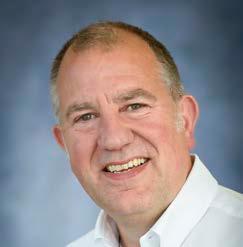

The Gym Group is expecting to deliver like-for-like revenue growth of around 3% for the full year, following strong trading momentum in the first half of 2025.
Reporting its interim results for the six months ending 30 June 2025, the low-cost gym operator saw revenue for the period increase by 8%, with average members up 4% and average revenue per member per month (ARPMM) up 4%. Group adjusted EBITDA (less normalised rent) was £27.4m – 24% ahead of the prior year period. The company attributed this to its revenue growth outpacing the cost inflation.
The Gym Group opened five new sites in the first half of 2025 and is currently on site at a further eight.
This means that the group is on track to open between 14 and 16 new sites in 2025, in line with its plan to open circa 50 sites over three years, funded from free cash flow.
According to Will Orr, CEO, the results are due to the successful delivery of the company’s Next Chapter

The Gym Group opened five new sites in the first half of 2025
growth plan – a strategic initiative to expand its UK market by “strengthening the core” of its existing business through improved pricing, member acquisition and retention, as well as by “accelerating rollout of quality sites”.
Orr said: “This strong set of half-year results reflects continued progress
against the strategic objectives set out in our Next Chapter growth plan 18 months ago. Our high-value, low-cost proposition continues to resonate. We are on track to deliver our target of opening 14-16 new gyms this year, all funded from free cash flow, taking us beyond 250 sites.”
NRG Gyms has acquired low-cost operator Pump Gyms, expanding NRG’s portfolio from seven to 12 sites. The acquisition of Pump Gyms and its five sites almost doubles NRG’s membership base and marks a significant step in the company’s growth plans.
The five Pump Gyms are located in Bedford, Hatfield, Norwich, Colchester and Northampton.
NRG, which plans to open its 13th club in Glasgow later this year, was founded and launched in 2012 by Shafiq Ahmed. The company has plans to become a significant player in the budget gym sector.
Ahmed, who holds the role of CEO, said: “This deal strengthens our footprint across the UK. “As we integrate Pump Gyms into the NRG family, I’m excited to deliver on our investment plans and bring our vision of providing best-in-class, inclusive gyms to even more communities.”
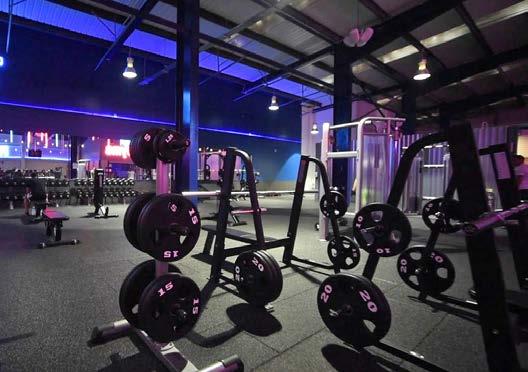

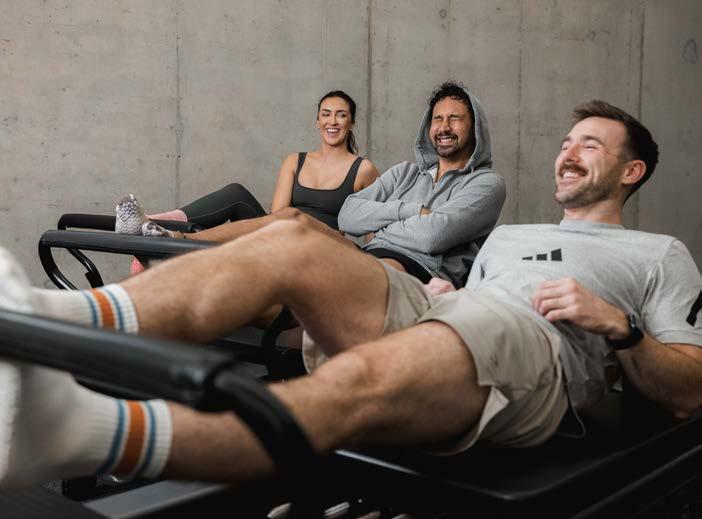
Franchised reformer pilates brand, tenreformer, has secured its first location in Islington, London.
To be owned and operated as a concept studio by parent company, Ten Health & Fitness, the studio is set to open in October 2025.
The Islington studio will feature 18 reformers designed in conjunction with Balanced Body and expert coaching teams delivering hands-on guidance, motivational support and a range of class concepts. Each instructor has completed the tenreformer course from Ten Education training programme, ensuring a consistent experience for members. Ten Health & Fitness launched the boutique franchise brand in April 2025, focusing exclusively on reformer Pilates classes.
According to founder, Joanne Mathews, the company plans to open at least 10 more tenreformer studios over the next 12 months.
“Securing our first tenreformer location after just six months, with three franchisees in progress – is a
huge endorsement of the strength of the concept,” she said. “The first location is an amazing marker, but we already have a number of other ongoing conversations and feel incredibly confident we’ll be able to hit our target of 10 franchises launched in the next 12 months.”
Tenreformer sites will offer studios equipped with 16-20 reformers, paired with coaches to provide personalised hands-on guidance to members. For an initial investment of £25,000, franchisees will get a licence to operate under the tenreformer brand with a turnkey ‘studio-in-a-box’ solution available for those looking to launch their own site – covering everything from location selection and studio design to training, marketing and operations.
Tenhealth launched the franchise concept to capitalise on the evergrowing popularity of Pilates, with ambitious growth plans underway following an initial investment from Foresight VCT of £1.5m.
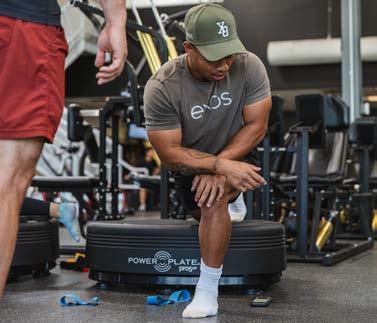
Power Plate has signed a strategic partnership with human performance specialist Exos. The collaboration brings together Power Plate’s vibration technology with Exos’ performance methodology, integrating Power Plate solutions across Exos’ network of clients and platforms, from corporate wellness solutions, and military settings to digital content integration. In addition, the Power Plate Academy and its CEU-accredited certifications will be embedded into Exos’ global education network, reaching more than 15,000 coaches, trainers and practitioners.
The Swimming Teachers Association (STA) has revealed the finalists for this year’s Aquatic Excellence Awards. The awards celebrate and showcase the achievements of individuals and organisations involved in delivering learn to swim programmes and aquatics training over the past 12 months. The 12 award categories include a wide range of nominations, covering both the private and public sectors, as well as UK and international companies and people. The winners will be announced at a presentation during STA’s national conference on 17 October.
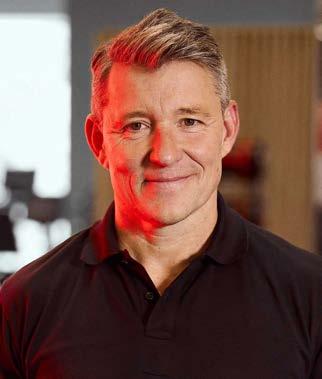
YOUR Personal Training has announced a partnership with broadcaster and presenter Ben Shephard, offering its entire network of personal trainers free access to Shephard’s new training course, Instructor 2 Icon.
Instructor 2 Icon taps into Ben’s 25 years of experience in broadcasting to address the ‘soft skills’ gap and help PTs to level up their communication skills, equipping them with the expertise to take command of their sessions.
EMD UK has appointed Dan Rees as its new CEO.
Rees, who has spent the past 25 years working in the fitness and physical activity sector, replaces the outgoing CEO, Gill CummingBell, who has led EMD UK through a transformative period of growth. Under Gill’s leadership, the national governing body for group exercise has increased its member base tenfold in recent years to more than 19,500 professionals, strengthening its role as the voice for group exercise instructors and leaders.
Rees began his career as an instructor and transitioned through working with operators to holding senior leadership and advisory positions at some of the UK’s leading fitness training and awarding providers – including Central YMCA and Premier Global.
“Throughout my 25-year career in the health, fitness and education sectors I’ve seen first-hand the lifechanging impact that movement, connection and community can have on people’s health and wellbeing,” Rees said. “Group exercise plays a vital role in addressing inactivity,
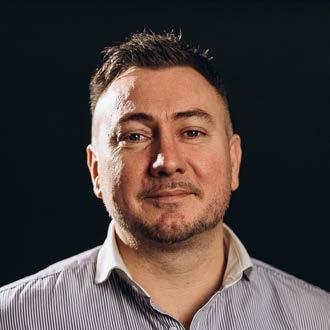
Rees has spent the past 25 years working in the fitness and physical activity sector
supporting mental and physical health and creating inclusive spaces where everyone feels they belong.
“EMD UK as the NGB is a powerful advocacy for change, championing instructors, driving standards and increasing participation in group exercise across the UK. I am excited to build on this strong foundation, working closely with the team at EMD UK, Sport England, our members, stakeholders and partners to amplify the voice of group exercise nationally and to ensure the sector continues to thrive.”
Shephard said: “I’ve been really impressed with YOUR Personal Training as an organisation. I hope the PTs enjoy the course and I look forward to hearing their feedback.”
James Lorey, Co-Owner & Director at YOUR Personal Training, added: “Instructor 2 Icon is arguably the most relevant course available to PTs right now. Good communication skills can be the difference between a PT running an average business and a thriving one.”
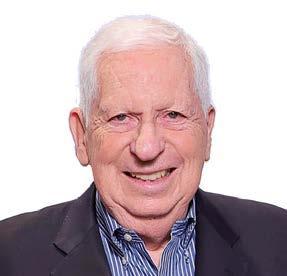
Fitness industry pioneer, Rick Caro, passes away
Fitness industry advocate and co-founder of the Health and Fitness Association, Rick Caro, passed away on 30 August, aged 79. During a career spanning five decades, Caro has had a huge influence on the health and fitness industry and was instrumental in the founding of IHRSA, now the HFA. Caro served as the organisation’s second president and was also awarded the first-ever HFA Lifetime Achievement Award in 2013.










SPLAN has completed the installation of two Model Y SPLAN Fitness Mirrors at The Ministry, Ministry of Sound’s London-based workspace and members’ club in Borough, SE1. The collaboration provides SPLAN with a dedicated London showcase while offering club members exclusive access to its mirrors which offer interactive, personalised fitness.
The Ministry, housed in a converted Victorian printworks, offers workspace, wellness, catering, unlimited events and fitness facilities to its members and guests.
Commercial strength and conditioning fitness equipment specialist, Eleiko, has introduced its next generation of bars.
The new range features smart sensor integration, which will allow custom-made sensors to be placed directly into each bar sleeve, giving lifters and coaches accurate quantitative and qualitative analysis and programming functionality.
The bars also feature Eleiko’s “Optimal Rotation System”, designed to ensure a bar’s response is “smooth, controlled, and consistent” regardless of the load or type of lift.

Budget gym operator, PureGym, has launched a comprehensive wellbeing package specifically designed for self-employed personal trainers and staff. Described as “first of its kind”, the initiative recognises that those who dedicate their careers to supporting others’ health and fitness deserve comprehensive support themselves.
The package provides every PureGym personal trainer with access to 24/7 online GP services, therapy and counselling sessions, in-person physiotherapy appointments, and financial wellbeing support, alongside substantial discounts on additional wellbeing services. It represents a significant investment in the health and professional development of the UK’s personal training community.
PureGym has partnered with digital health platform HealthKey to deliver the new resource. David Joeering, CEO and co-founder of HealthKey, said: “PureGym’s initiative represents a fundamental shift in how the fitness
industry views professional support.
“With more than 3,000 personal trainers operating across the UK, the majority working as self-employed contractors, this demographic has historically fallen through the cracks of traditional employee benefits. By providing comprehensive wellbeing support alongside professional development, PureGym is creating a blueprint that other operators should follow.”
The launch comes at a time when the fitness industry is increasingly recognising the connection between staff wellbeing and service quality. PT turnover costs gyms significantly in recruitment, training and lost members, making comprehensive support both a retention strategy and a quality improvement initiative.
The wellbeing package builds on PureGym’s professional development programme, which provides personal trainers with over 26 hours of CIMSPA-accredited education.
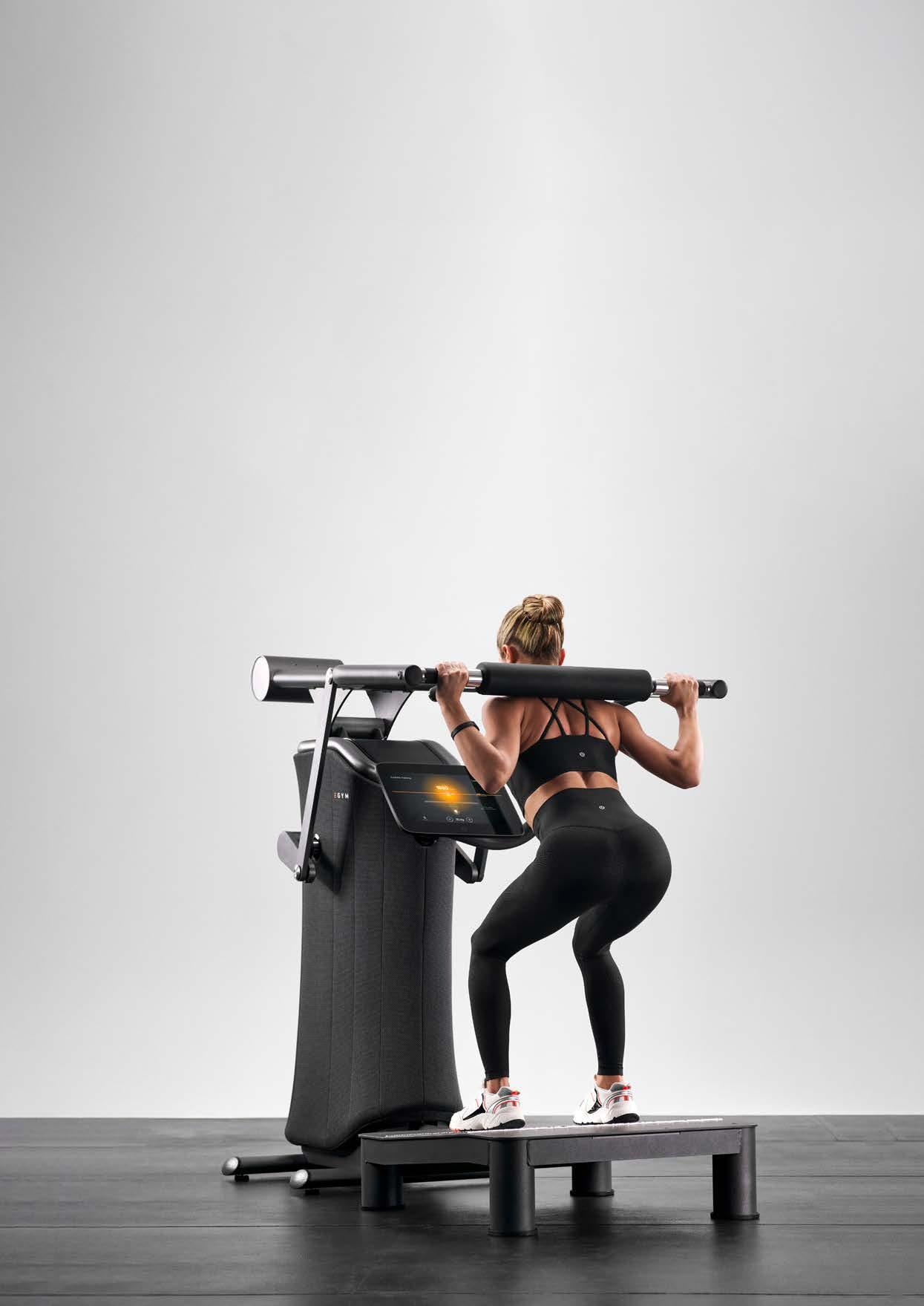
Unlock your gym’s potential with powerful, data-driven solutions that drive results, boost performance and elevate the customer experience.
Work has officially begun on the £43m Cascades Leisure Centre project in Kent, after Gravesham Borough Council has signed a pre-construction contract with Willmott Dixon.
Under the pre-contract agreement, Willmott Dixon will work alongside project architects Space & Place and engineering consultants Atkins-Realis to develop the technical design and specification for the new low-carbon leisure facility. The move comes after the green light was given earlier this year for the allocation of £20 million from the government’s Levelling Up Fund towards the project.
£17 million of the funding will be used to help replace the ageing Cascades Leisure Centre with a new health and wellbeing hub.
The remaining £3 million will be used to deliver a range of initiatives within the borough’s urban areas, to improve public spaces, create new workspaces for small businesses and accommodate new community uses. The Cascades Leisure Centre project

The £42.9 million low-carbon building that can host regional events
will see a new, £42.9 million low-carbon building that can host regional events alongside an improved family-fun offer. The centre will include a 25m pool, 17m learner pool, an aqua play and water flume area, along with a spectator viewing area. There will also be a sports hall with six courts and
tiered seating, a multi-level soft play zone, party and community rooms and a café, all on the ground floor. The agreement runs until August 2026. At this point a main contractor will be appointed to build the new leisure centre. The new centre is due to be completed in December 2028.
Boutique gym operator Foundry, which specialises in small group training, has opened its seventh site in London – its largest to date.
The 5,000sq ft studio in Moorgate features spaces for personal training and classes and has been designed to continue the brand’s mission to make elite coaching accessible in a premium, functional and friendly space. The Moorgate site will also be the first Foundry studio to offer physiotherapy services.
Foundry delivers 50-minute personal training sessions, on the hour, every hour, with no mirrors or mobiles on the gym floor.
Launched in 2016, the operator’s approach is built around team-based training, capped at six people per session, with a focus on community over competition.
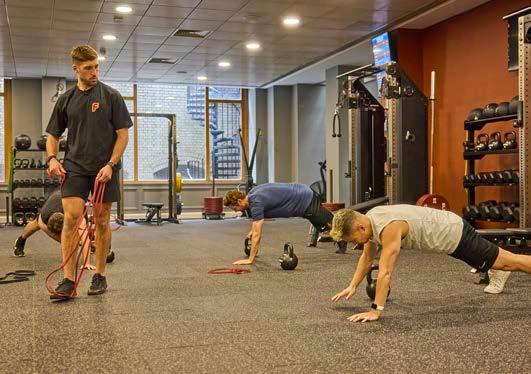




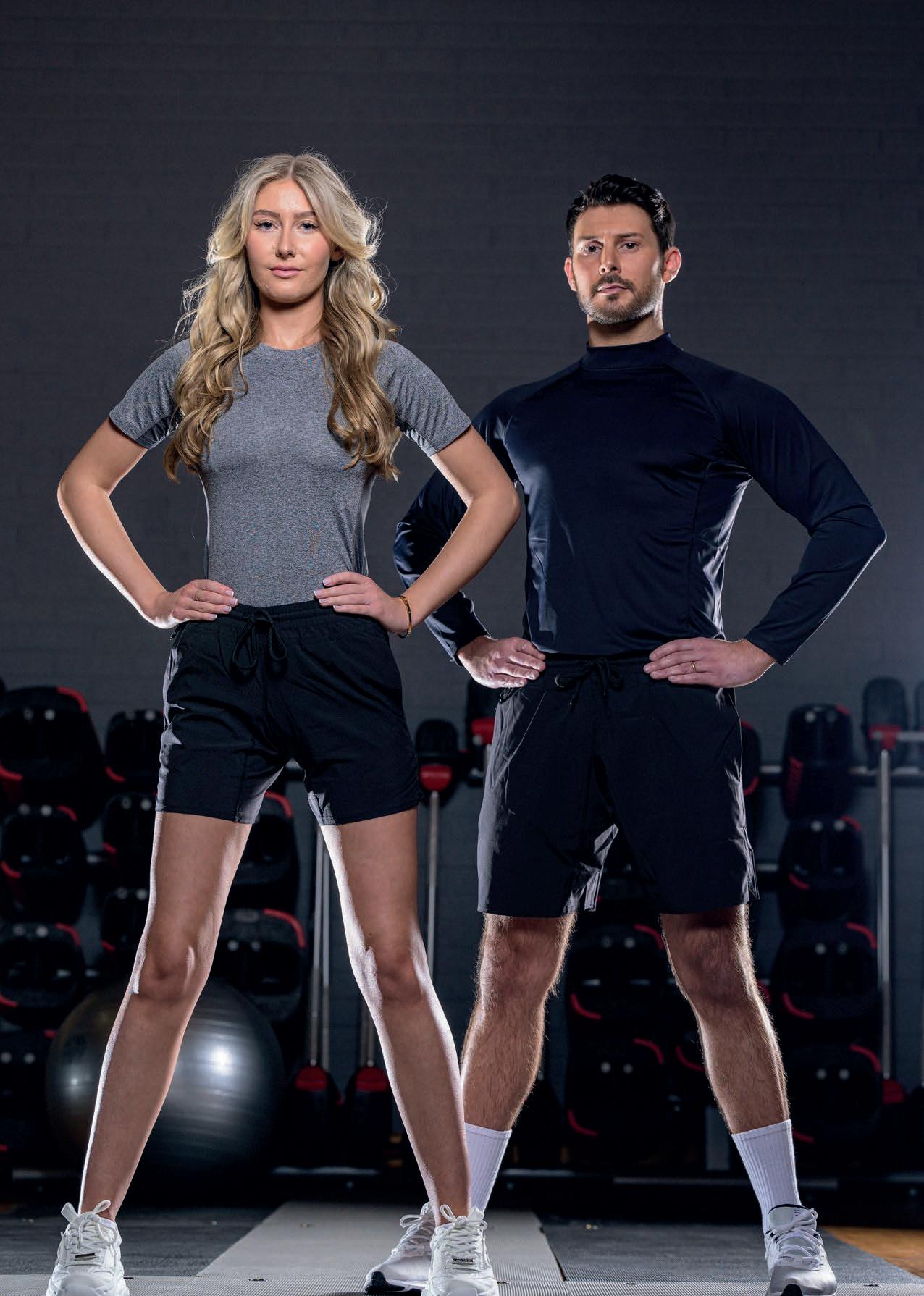

Technology meets wellness, creating a unique health proposition for memberships, providing new revenue streams, increased retention and greater member satisfaction
As the UK fitness industry evolves, operators are looking for new ways to stand out beyond equipment, classes, and facilities. Members now expect support that covers both fitness and wellbeing. They want support in all facets of their health, and operators are perfectly placed to deliver this.
HealthKey provides the infrastructure that allows operators to deliver that experience seamlessly, while also generating additional revenue streams and improving retention. Its platform helps gyms, boutique studios and leisure providers design bespoke, holistic

memberships that combine traditional access with on demand virtual GP services for the whole family, physiotherapy, mental health support, nutrition guidance, financial health, diagnostic tools and more.
Creating a complete health and wellbeing offer is a large undertaking. It involves clinical partnerships, compliance frameworks, and technical systems that take time and expertise to build. HealthKey handles that complexity . Through its modular platform, gyms can integrate the services that make sense for their members and business model. This gives operators a flexible way to expand their offering and deliver measurable value without becoming healthcare providers themselves.
HealthKey helps operators open new revenue opportunities by allowing them to:
l Introduce higher-tier memberships that include health and wellbeing benefits
l Offer add-on services such as physiotherapy or counselling
l Bundle a range of health and wellbeing services into premium plans
l Improve retention by offering services members use regularly and value highly
These services increase perceived value and help strengthen loyalty. Members who see their gym as a partner in their health are more likely to stay, engage, and recommend it to others.

With energy prices, staffing costs, and rent all rising, membership prices are being forced up. HealthKey gives operators a way to add real value at the same time.
Instead of asking members to pay more for the same service, operators are including new health benefits within the membership for a much higher perceived value to members than the cost of delivery. This helps reduce churn, increase average revenue per member, and improve satisfaction while maintaining a healthy bottom line.
HealthKey already works with a range of gym and leisure operators, including PureGym, F45, Sandwell Leisure, and FFit Conwy.
FFit Conwy’s Premium members can now access virtual GP appointments, physiotherapy, counselling sessions, and nutrition support through HealthKey. PureGym has also partnered with HealthKey to bring new wellbeing options to its PTs and staff.
By giving operators the tools to offer holistic health memberships, HealthKey is helping to reshape how the industry thinks about value. It allows operators to stay competitive, create new revenue streams, and improve outcomes for their members by supporting them beyond the four walls of the gym

As HealthKey CEO David Joerring explains:
“Our goal is to help gyms evolve into holistic health destinations. When members see their gym as central to their wellbeing, everyone benefits: the member, the operator, and the wider health system.”
For operators facing higher costs and greater expectations, HealthKey offers a practical way to strengthen their business while giving members more of what they want, providing them with support to live a healthier life.
For more information about HealthKey and to set up a trial, contact CEO and Co-founder David Joerring at david@healthkey.health or info@healthkey.health
The new £36 million Blairgowrie Recreation Centre has officially opened its doors to the public.
The new “ultra-low energy” centre features a 25m swimming pool with moveable floor, a four-court sports hall, a health club with a large gym floor, dance studio and an external 3G sports pitch.
Designed by architects Holmes Miller, the facility is the first leisure development in Scotland to be built to Passivhaus standards. It replaces Blairgowrie’s original 1980s facility and is only the second Passivhaus leisure centre in the UK – the other being St Sidwell’s Point in Exeter, Devon.
Funded by Perth and Kinross Council – which owns the building – the project was delivered through Hub East Central Scotland and built by BAM Construction. The facility will be operated by Live Active Leisure on behalf of the council.
Perth and Kinross Council leader Councillor Grant Laing said: “This is a really important
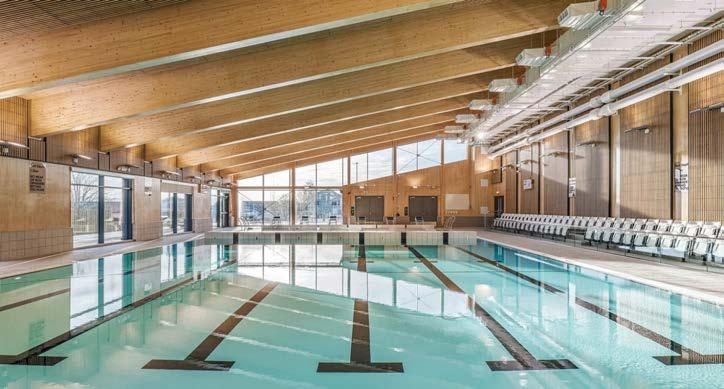
day for the people of Blairgowrie and across Eastern Perthshire.
“Plans for the centre were first put forward years ago but the green light for the project was only given in 2022 when the Council agreed to fund this £36 million project. It has been a long road to get to this point but I am sure this will be a much-loved and well-used facility.”
Fully constructed from Cross Laminated Timber (CLT) and Glulam, the low-carbon building will reduce energy consumption by up to 80% compared to a typical leisure centre. Holmes Miller estimates that the building will boast the lowest operational energy use of any Passivhaus-certified leisure or sports centre in the UK.
Plans have been revealed for a £65m sports and leisure facility in Brighton. Set to replace the ageing King Alfred Leisure Centre, the proposed facility will transform the current seafront site into a “modern, accessible and sustainable leisure destination for all”, with spaces for sports, leisure and social and wellbeing activities.
Exact details for the project – which is led by the council’s main delivery partner, Alliance Leisure and its team, which includes GT3 Architects – will be confirmed, but are likely to include a larger fitness suite, a leisure water area, a family entertainment zone and improved accessibility throughout.
The building is designed to make the most of its seafront location, offering sea views from the pools, gym and café, while landscaping will connect it to a revitalised public realm.
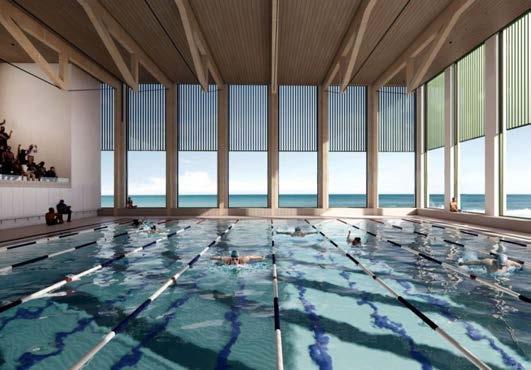
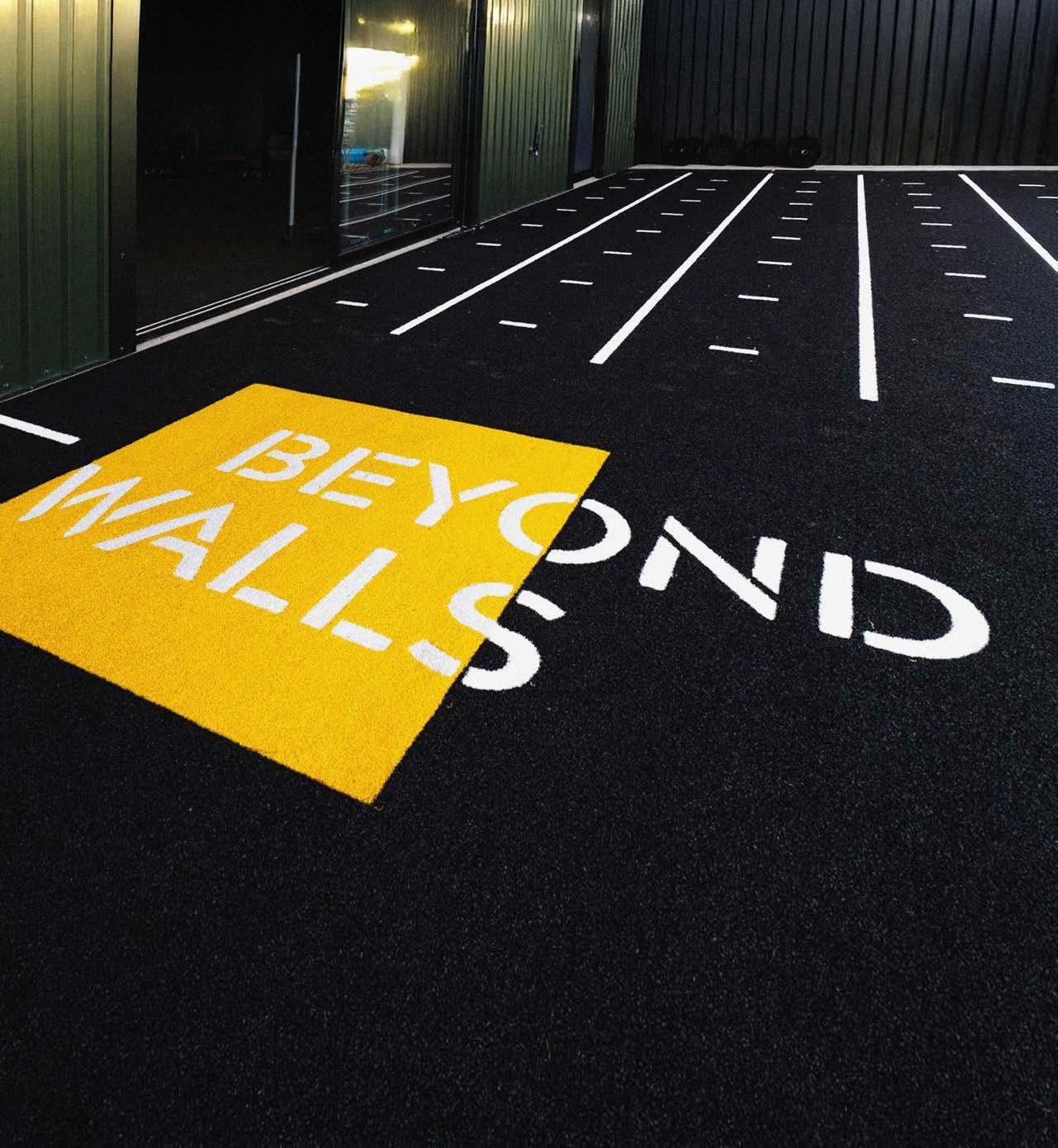

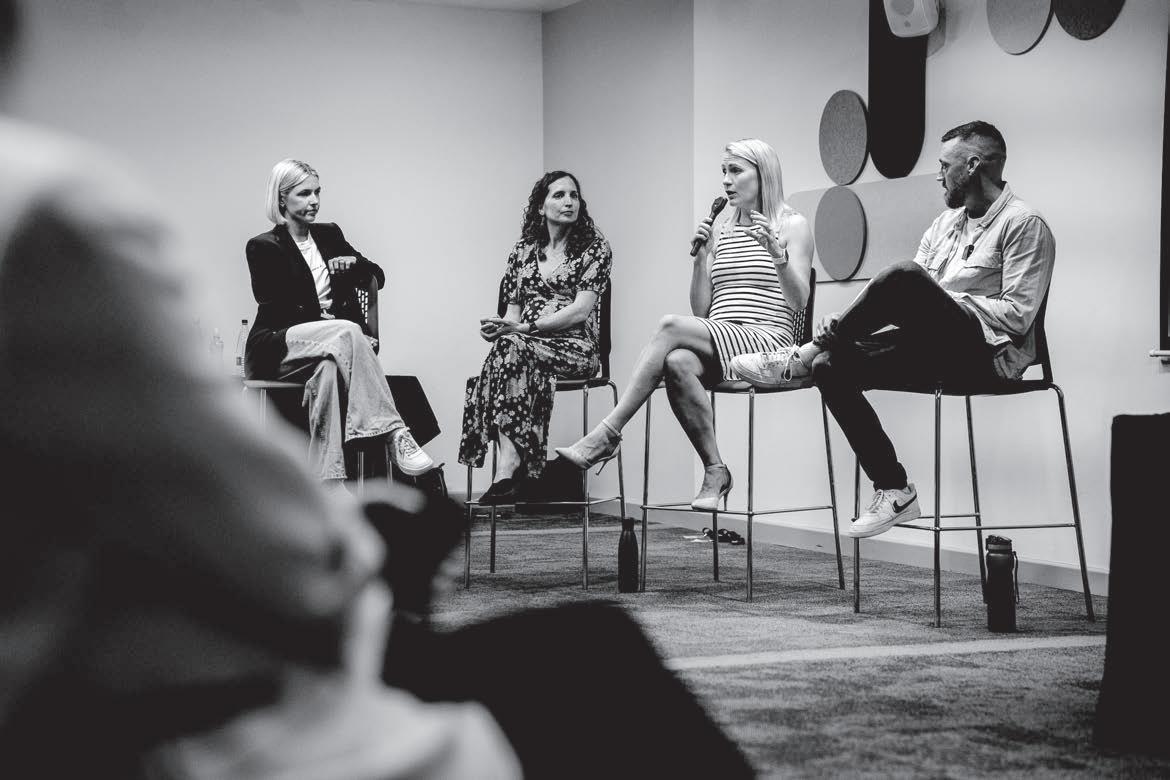

13TH - 14TH NOVEMBER 2025
Construction has begun on a new leisure centre and library in Bishop Auckland.
An official ground-breaking ceremony marked the start of the project, which will see two existing facilities – Woodhouse Close Leisure Centre and Woodhouse Close Library – replaced with a modern community hub.
When complete, the new venue will feature two accessible swimming pools, a large health club with a gym floor and two group exercise studios, a Move Hub with power-assisted equipment, a sauna and steam room, soft play centre. and a café. There will also be a fully integrated library space. Enabling works have been ongoing since the summer to prepare the site, which included the demolition of Woodhouse Close Library. The council has appointed Morgan Sindall to carry out the work. The project is funded by Durham County Council – which owns the facility – with a £2.75 million contribution
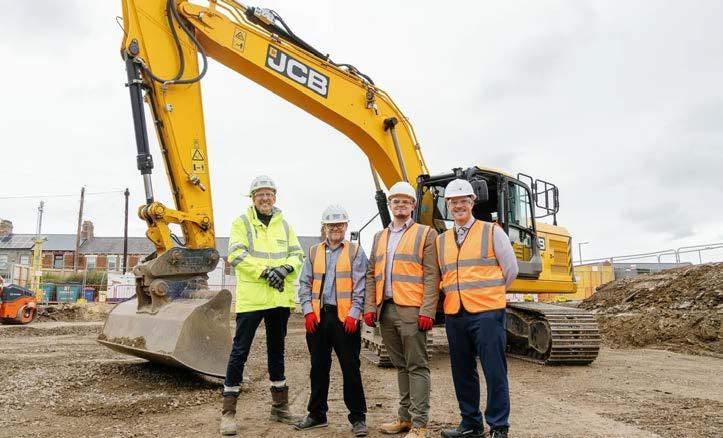
from Sport England. Construction is expected to be completed in 2027.
Councillor Joe Quinn, cabinet member for resources, investment and assets, said: “This project is being delivered as part of our Leisure Transformation Programme through which we have been creating modern
and accessible facilities across our towns to encourage more residents to engage with leisure activities and live healthier lives. The new centre also supports our wider ambition to build better communities and thriving towns through the provision of up-to-date facilities.”
Fitness equipment giant, Precor, has introduced its new Breakaway Treadmill, a heavy-duty commercial slat belt model built for gyms, health clubs and studios.
Featuring a responsive slat belt deck, sled-style Push Mode and operator-ready service design, Breakaway Treadmill has been engineered to provide facility members with a distinct, comfortable and powerful feel underfoot.
The treadmill’s rubberised slats have been designed to absorb impact and create a smoother stride. The Push Mode transforms the treadmill into a sled-style workout for acceleration, power and HIIT without the need for additional equipment, while an in-built Cadence Coach provides exercisers with real-time step-rate feedback to support pace, tempo and training consistency.
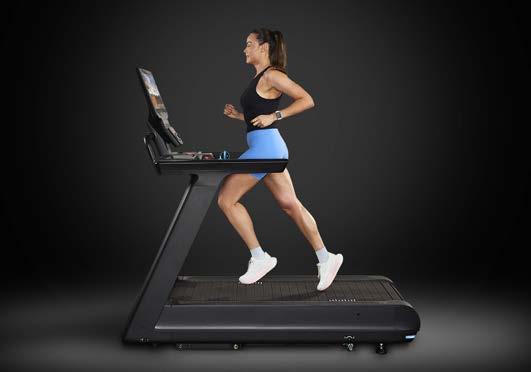
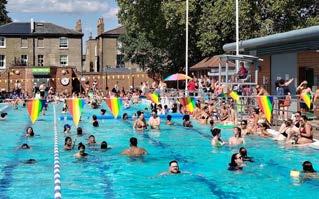
“Warmest ever summer” results in a busy year for lidos
The UK heat waves and hot spells this summer have resulted in record-breaking numbers of Britons visiting the country’s outdoor pools and lidos. In Wales, visitors have flocked to Lido Ponty – the only facility of its kind in the country – with 47,000 people having visited the site by mid-July.
In Hitchin, Hertfordshire, after temperatures reached an unseasonably warm 23°C in May, more than 430 people turned out for the launch of a brandnew pilot programme at the town’s outdoor lido – and the pool has been busy ever since.
Elsewhere, Greenwich Leisure – which operates leisure centres and pools on behalf of local authorities under its Better brand – said that the summer of 2025 was the “busiest it has ever seen” in lidos and outdoor swim spots.
All of Better’s nine lidos recorded increased footfall in 2025, with Oxfordshire’s Abbey Meadows Outdoor Pool usage rising by 112% and Woodstock Open Air Pool recording a 76% increase in swim visits. Elsewhere, Better’s London Fields Lido in Hackney, London, saw visits increase to 133,040 (up from 117,880).
Andrew Clark, Head of Sport and Aquatics at Better said: “It’s been a phenomenally busy summer season in Better’s lidos.”

Right Directions, provider of health & safety and quality management expertise, has acquired the staff and operational management platform, StaffMIS.
Founded in 2016, StaffMIS can be used to document, monitor and manage operations records, with accessibility and time-saving functionality at its core.
The platform consists of five modules; Information Management, Tasks and Checks, Training Management, Time Management and Communications.
Largely developed for the sport and leisure industry, Right Directions has been working in partnership with StaffMIS for the last five years, with many of its leisure industry clients already using the system. It is currently used by more than 100 organisations across almost 2,500 facilities.
Following the acquisition, Right Directions will introduce a range of newly developed features to the platform. The first of many will be an asset management
function, which will include the ability to track the completion of checks against assets, along with recorded maintenance issues.
Caroline Constantine, Managing Director of Right Directions says: “Our goal has always been to streamline administrative tasks and simplify life for our clients who face the daily challenges of running busy facilities; their time can be better spent focusing on delivering exceptional service and enhancing the customer experience, rather than being tied up with paper everywhere and manual processes.
“Listening intuitively to client’s needs and suggestions is a key factor in the improvement and development of any service, and has been the driving force behind our strategic move to acquire StaffMIS. As the StaffMIS decision makers, with no hoops to jump through, we are excited to be able to turn our ideas (and those of our clients) into reality. I only wish I had these tools when I was managing leisure centres.”









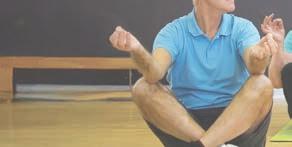




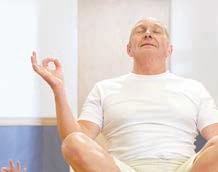


















Power-assisted fitness equipment specialist, Innerva, has added to its increasingly popular range of active ageing solutions
Innerva has launched the next evolution of its power assisted exercise solution, which supports active ageing through personalised insights, real-time progress tracking and the collection of valuable health data.
Co-designed with older adults and academic partners, including the Advanced Wellbeing Research Centre at Sheffield Hallam University, the new Innerva Connect not only enhances the activity experience for older adults and those living with chronic health conditions, it also provides the information needed to build partnerships with the health sector.
Jon Hymus, Managing Director of Innerva, says:
“Operators are looking for ways to work more closely with healthcare professionals and Innerva Connect gives them the tools to do that. The insights offered by the new platform demonstrate the impact of their active wellbeing offer, providing meaningful data to support partnerships and bridge the gap between fitness, health and social care.”
Each machine in the Innerva circuit collects anonymised data on customer activity allowing operators to understand the types and prevalence of long-term health conditions of their customers,
It’s given us meaningful data and deeper insight into our users and operations

monitor system usage and track user engagement. The secure cloud-based system offers the ability to visualise trends, generate reports and make datadriven decisions through interactive dashboards.
In an industry where products are often designed for younger audiences, Innerva worked closely with its end users - whose average age is 67 - throughout the design and development process to create a digital solution tailored to the needs, abilities and preferences of older adults. Tried and tested by end users, pilot programmes have shown that older adults are keen to engage with the digital product, finding it intuitive, accessible and effective. Its ease of use significantly reduces barriers to adoption helping to encourage long-term engagement.
Innerva Connect gives end users real-time feedback on their sessions and performance to boost motivation and support users to achieve their personal exercise and rehabilitation goals.
“It’s great to get feedback on my activity. I can now share this with my GP to show the improvements I’ve made. My increased exercise and activity have had a really positive impact on my overall health. Now there’s actual proof they can see,” said one user.
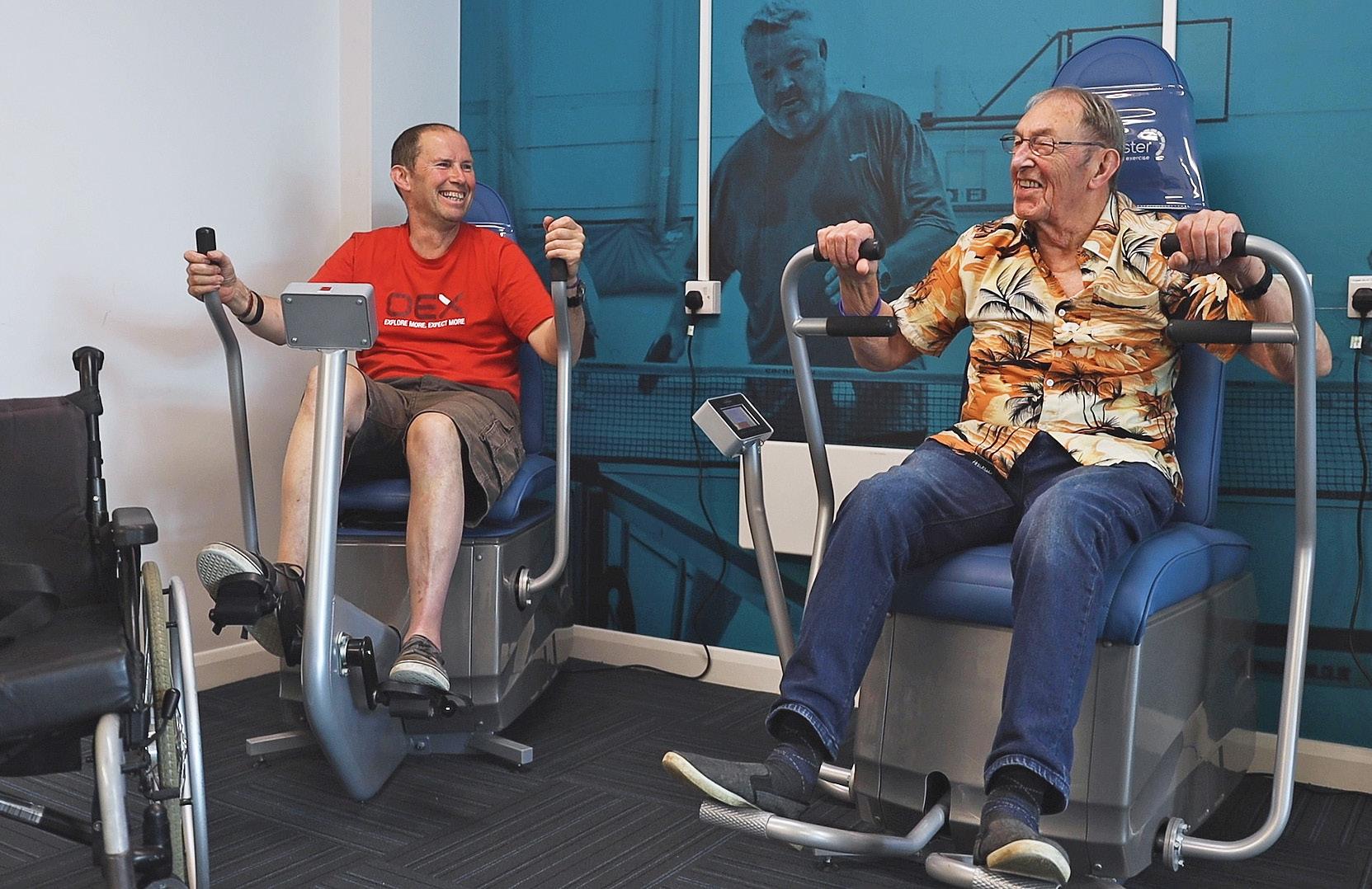



The web application also allows customers to manage bookings and membership, and gives access to valuable resources such as information on active ageing and equipment usage guides.
Designed to be future-compatible to enable ongoing developments and software upgrades, Innerva Connect seamlessly integrates with other service and customer management platforms to support collaboration through open and adaptable architecture.
Burnley Leisure & Culture is one of several operators to have supported the co-design of Innerva Connect with long-standing Innerva users at its St Peter’s Leisure Centre site.
Scott Bryce, Chief Operating Officer, Burnley Leisure & Culture, says: “Innerva Connect has been a fantastic enhancement to the Innerva solution and our Active Hub. It’s enabled us to gather meaningful data on our users’ health conditions, while also offering deeper insight into our customer demographics and operational performance. Our members really appreciate the straightforward design of the application, and they value being able
Innerva Connect gives operators the tools to bridge the gap between fitness, health and social care
to track and understand their effort both during their sessions and afterwards. It’s become an essential part of how we monitor and support user progress.”
The new platform formed part of the UK Research and Innovation’s (UKRI) Healthy Ageing Project, which aimed to empower people to stay active, independent and socially connected for as long as possible.
As a Cyber Essentials Plus certified company, the highest level of accreditation under the UK Government’s Cyber Essentials scheme, Innerva and the new platform are committed to operational resilience, data protection, security and compliance. Innerva Connect also meets the highest GDPR standards, ensuring safeguards for user data and privacy.
Detailed plans to invest in the future sport and leisure provision in Ulverston, Cumbria, are set to be finalised this year.
Westmorland and Furness Council said that “clarity had now been confirmed” around available funding, so work on a phased approach to improving facilities could press ahead.
The council plans further engagement with users and sports clubs based at Ulverston Leisure Centre on Priory Road, which will inform the final plans.
The initial phase of the work, funded by £2million from Westmorland and Furness Council, will concentrate on essential improvements to existing facilities at the centre. Ulverston Leisure Centre is operated on behalf of the council by GLL.
Facilities at the centre currently include a 25 metre swimming pool, health and fitness club with a gym and group exercise studio, as well as Cumbria’s largest tennis centre. Outdoor facilities
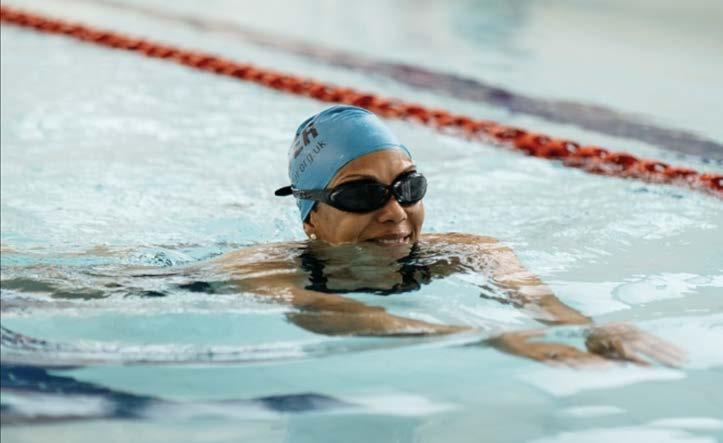
The council will shift from a “pure leisure offer” to an active wellbeing service
include a 3G football pitch.
The intention is to shift from a “pure leisure offer” to an “innovative and modern active wellbeing service for all”.
Councillor Vicky Hughes, Westmorland and Furness Council’s Cabinet Member for Planning and Active Wellbeing, said: “We’re now
able to progress with the first phase of work, now that we have a better understanding of the available funding.
“Engagement with centre users and local sports groups and clubs has given us a good understanding of how the current facilities are used and how they could be improved.”
Work has begun on a £2m refurbishment of the Pingles Leisure Centre in Nuneaton. The redevelopment, which is expected to be completed by January 2026, is being funded by a joint investment from Nuneaton and Bedworth Borough Council – which owns the facility – and Everyone Active, which operates it on behalf of the council. The project is scheduled to be completed by January 2026. Once completed, Pingles Leisure Centre will feature an extended and enhanced gym, new group cycling studio and new water features. The main group exercise studio is being relocated downstairs and will have a new look and feel. There will also be a water confidence paddling pool
The leisure centre’s gym floor is set for a considerable expansion, from 80 stations to 130, and will feature Life Fitness equipment.

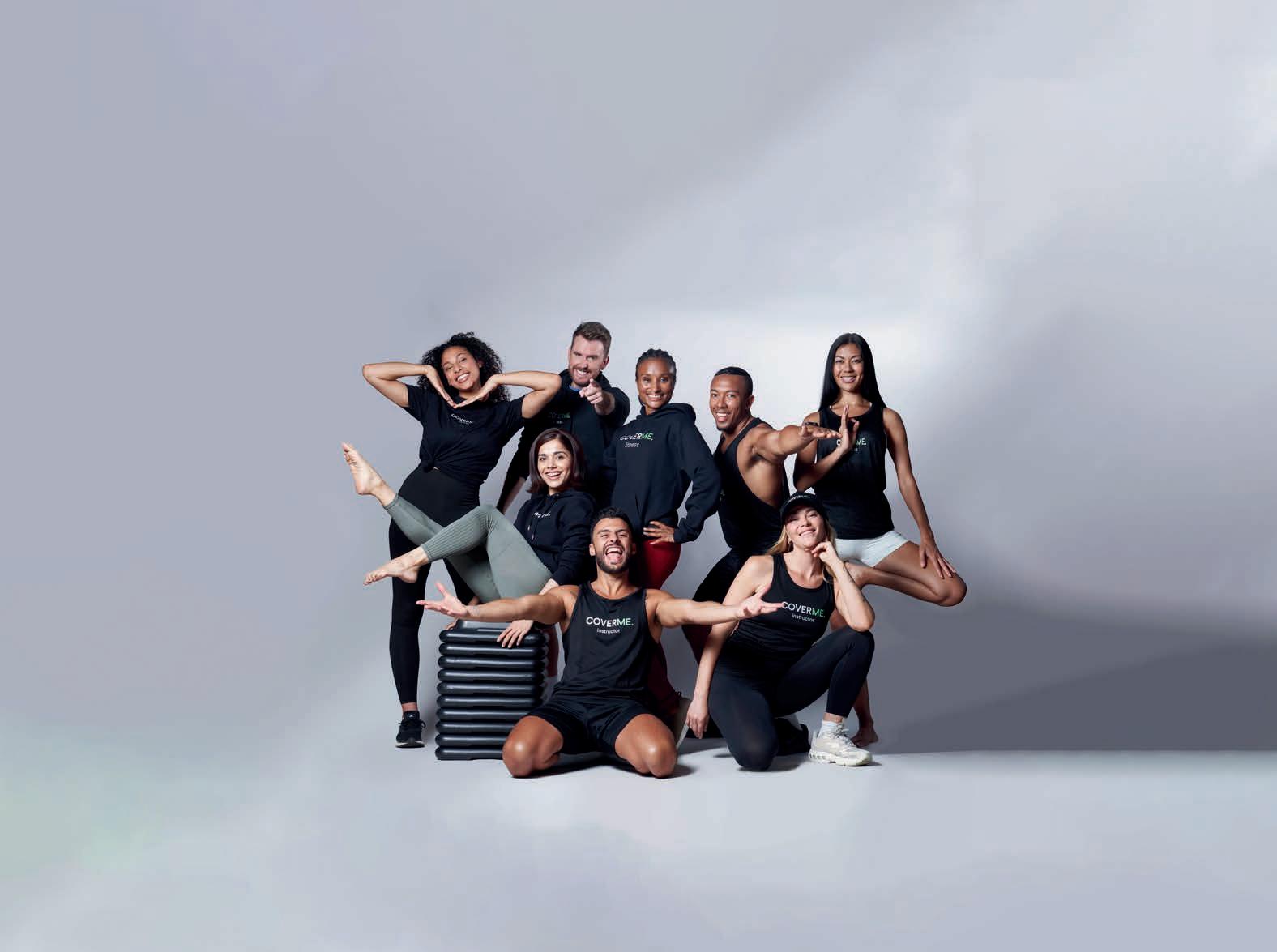

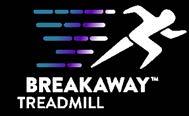


Plans have been submitted for a new leisure centre in Larkhall, South Lanarkshire. Described as a “highly sustainable, communityfocused facility”, the facility will replace an existing centre, which first opened in 1966.
To be owned by South Lanarkshire Council, the proposed facility has been designed by architects Holmes Miller and is set to be delivered in collaboration by BAM Construction and hub South West.
Plans for the 3,040sq m, twostorey facility include a 25m, six-lane swimming pool with a spectator terrace, a health and fitness suite with flexible exercise studios, sauna and steam room, a gym and fitness studio and a sports hall.
According to Holmes Miller, a key feature of the project will be its strong environmental performance.
“The building will be delivered using a Cross Laminated Timber (CLT) structure and designed to meet Passivhaus principles – significantly reducing both operational and embodied carbon,” Holmes Miller said in a statement.
“These measures support the council’s wider ambitions for delivering efficient, futureproofed public buildings.”
Yida Zhou, Project Architect at Holmes Miller, added: “This building is designed to be simple, calm and intuitive – a healthy environment.”

Zoom Media has launched a new rewards ecosystem designed to help gym and leisure operators close the “retention gap”. Called Motion Plus, the platform will deliver personalised, tech-integrated and behaviourdriven incentives that look to reflect the individual needs of members.
Zoom Media – a specialist in-club media and engagement solutions provider – says that by doing so, the platform challenges “outdated models of fitness rewards” and will help operators boost retention and enhance member engagement. Motion Plus looks to tap into the experience of industries such as supermarkets, airlines and hotels, which have long thrived on loyalty programmes.
“With more competition than ever, the option for members to cancel at any time, and countless pay as you go options available, we are making the case to ensure members in the leisure sector feel truly valued,” Zoom Media said.
“Our recent white paper, Fit for Loyalty, highlighted that, while acquisition costs continue to climb, most loyalty programmes remain generic, underused, or invisible. One in five members say rewards and incentives influence their decision to stay, yet this 20% represents an often-overlooked group.”
Motion Plus looks to utilise behaviour-based triggers to reinforce healthy habits inside and outside the club, as well as personalisation and gamified milestones to keep members motivated. The whitelabel platform can be fully integrated with any operator system.
Ferne Langford, Strategic Partnership Director at Zoom Media, added: “Gyms have evolved. Members have evolved. Loyalty strategies haven’t.
“The industry’s been throwing free towels and protein bars at a retention problem, but when only one in five members say rewards influence their loyalty, something clearly isn’t working.”

find out more



Bringing together the UK’s leading operators and suppliers in health, fitness, sport and leisure.
One-to-one meetings and inspiring seminars
EVENTS

Holme Pierrepoint 15 October 2025 th

Bolton Arena 3 December 2025 rd




Eastwood Hall, Notts 26 - 27 March 2026 thth













Leisure operator, Everyone Active, has launched a new low-cost, activitybased membership. The Move More membership is available across six pilot sites to engage inactive populations through inclusive and accessible sport, swim and social activities.
The three-month, means-tested membership removes cost barriers and supports individuals on Universal Credit or Pension Credit who are currently inactive. Members gain access to specialised activities such as quiet swims, walking sports, Good Boost sessions and community programmes, with the aim to reduce social isolation and promote wellbeing.
The Move More membership contributes to the NHS 10-year health plan by helping to create more sustainable and accessible community-based solutions. It is also designed to meet the needs of each local community, so activities vary at each leisure facility, with a focus on social and inclusive activity to encourage participation.
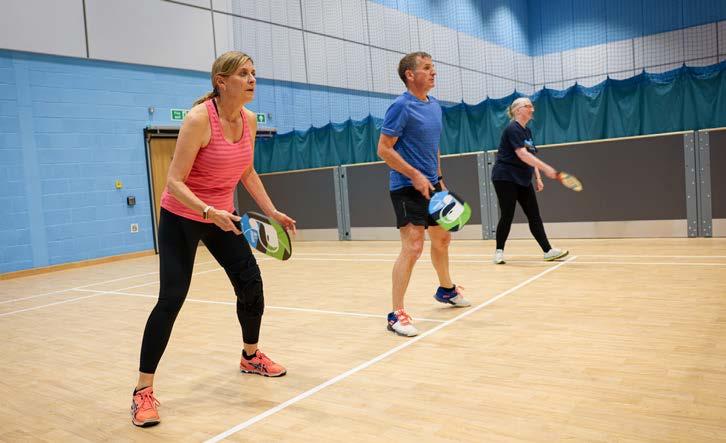
Everyone Active’s Group Aquatic and Activity Manager, Ian Cotton, said: “This activity-based membership allows us to engage with inactive populations and work closely with partners such as DWP, Citizen’s Advice, housing associations and adult and social care. The membership
provides affordable opportunities for people to benefit from regular activity in a supportive environment.”
The three-month memberships cost from £9.90 to £15 per month and will initially be available at six Everyone Active facilities – from Hucknall Leisure Centre to London Aquatics Centre.
Awarding organisation Active IQ, training provider Future Fit and men’s mental health charity StrongMen have partnered to provide StrongMen volunteers and staff with accredited wellbeing qualifications. Through the collaboration, Future Fit Training will provide its Wellbeing Coach qualification free of charge to 30 StrongMen staff and volunteers, while Active IQ will cover all registration and certification fees. The initiative aims not only to upskill the volunteers, but also to equip them with valuable tools to support others in their community through a holistic approach to wellbeing.
StrongMen is a charity dedicated to helping men navigate bereavement through comprehensive support, including weekend retreats, peer networks, and other helpful services.
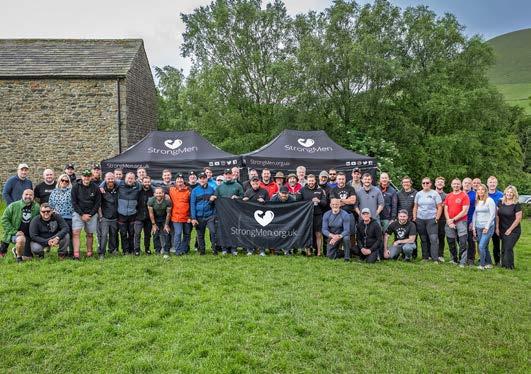

















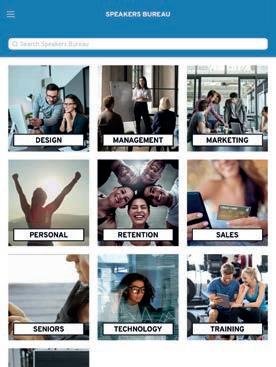




Welcome to the VirtualRoadshow.App… Welcome to the future of fitness education.




Have you ever gone to a conference and seen a great presentation and gone back to your Club and tried to describe what you learned to your staff, and something seemed to be missing in your description?





Well, with the VirtualRoadShow.APP you can literally show them, pause and discuss, rewind, fast forward. Stop… and then it’s there to be viewed again and again for a refresh, or new hires. You’ve literally got a 24-hour Conference in the palm of your hand…




Scan the QR code, register online in the Virtual Store at www.VirtualRoadShow.online, download the .APP, log in and start your £1 Try All today.





Every Thursday at noon GMT one of our presenters, trainers or coaches from the world of fitness deliver unrivalled guidance, advice, training and support on building, growing, and scaling your gym business.
From leadership, to coaching, to marketing, to sales, and beyond.
✓ Hours and hours of Actual Experience… condensed down into one-app. over one hour.
✓ Designed to help you and your staff learn, how you want, when you want!
✓ Scan the QR code, download the app and start your £1 trial today.
✓ All presentations are archived within the app so as well as a weekly live stream, you and your team will get access to the Virtual Roadshow archive.... A library of limitless advice, guidance and support that builds week on week as content is added...
✓ View them on your phone or tablet 24/7 - 365 days a year.
We virtually bring the industry to you with A I… Actual
Our Current Alumnus of presenters, educators and trainers in our Speakers Bureau include:
Pete CohenFrank Furness
David MintonColin Milner
Doug MillerBryan O’RourkeDr Mark SlavinJustin Tamsett
Casey ConradLaurie MetrickLexie GriffithsAlan Leach
Adrian MarksDr. Paul BedfordFred HoffmanSandy CoffmanHans MuenchHerb Lipsman
Dave StalkerBenny Price
Dan LynchJon Nasta
Joanne GrovesRichard BoydBobby CappuccioMichael Scott Scudder
Lesley AitkenRay GordonDerek BartonUlf Bengtsso
Peter WebbCristophe AndansonHenrik GockelJarrod AsraccoRob Lander
Our Speakers Bureau have over 1,000+ YEARS of Actual eXperience.

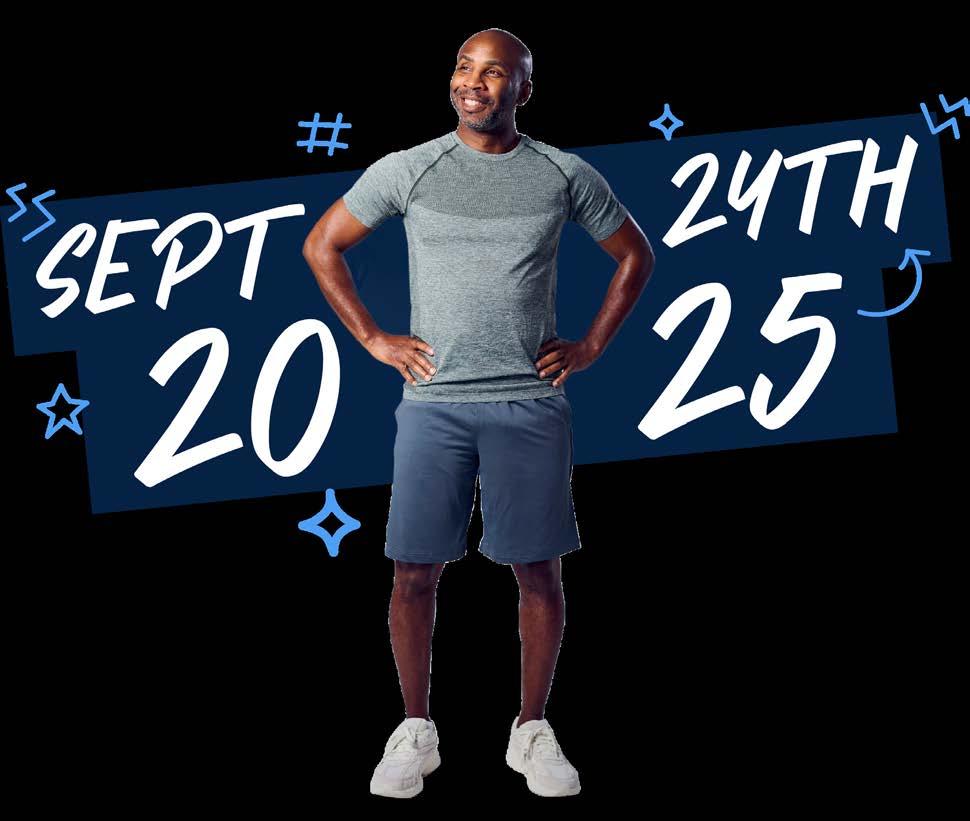
This year’s campaign saw a wide range of activations across the UK
Simple human stories and local engagement are helping our sector’s value resonate more strongly in Westminster
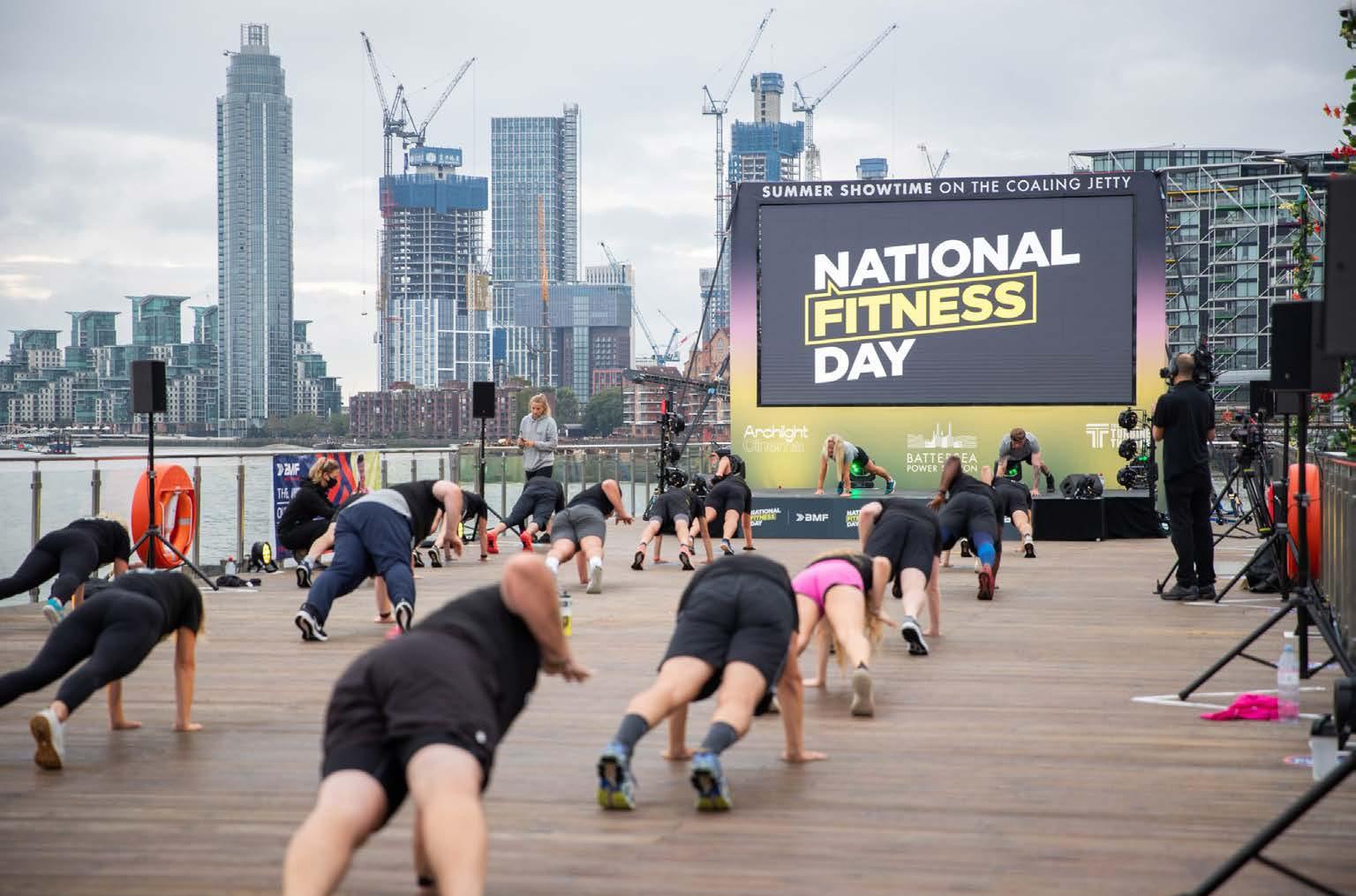
Rob Gibson Interim Director of Policy and Communications ukactive
Most WellNation readers will have played their part in National Fitness Day, the campaign founded by Energie Fitness before it was gifted to ukactive to help it to grow.
This year saw us celebrate its 14th anniversary and the theme, ‘Powered by you’, showed our ambition to go even further with the engagement we delivered with our members and generating greater political support.
It’s no secret that the key to ‘NFD’ is the creativity and energy of ukactive’s incredible members and this year was no exception, with fantastic activations across the UK, from the large multi-site gym and leisure operators to the independents on our high streets and suppliers nationwide. ukactive staff visited our members’ sites across the regions to meet the teams and help capture

the energy and stories to add to the countless social media posts which saw the campaign trending across X and reaching many more people on Instagram, Facebook, LinkedIn and through media coverage.
But this year’s campaign was also notable for the support secured from over 50 MPs. In advance of the day, ukactive hosted a stall complete with exercise bike and dumbbells in Portcullis House at Westminster, sparking conversations with passing MPs and staffers, who were then matched with our members’ facilities in their constituencies to visit on the day.
Like all good campaigns, NFD provides an important spotlight amid the wider agenda. Just as this national celebration of fitness inspires people in communities, it can also reach more in Westminster, which is particularly important given the seismic shift in new MPs following the General Election. And in the same way we extend the length of our campaign message beyond simply one day, NFD forms part of a much wider programme of political engagement too – from Fit For Office with Myzone in the spring, to regular meetings with MPs and Government departments throughout the
calendar, where the more sober business of policy is addressed. The meetings cover a range of issues, from the return on investment in facilities and programmes for the NHS and the economy, to ongoing operational threats, supported by local and national data.
The challenges posed by the economy and the machinery of Government are clear to all, but the conversations held with MPs around NFD reflect a growing understanding and appreciation of our sector’s work and challenges. Our relationship with physical activity is deeply personal and talking to MPs, the same is true. From the MP who told me about her back problems and the importance of exercise, to the response from the Sports Minister who joined us to meet staff at Dearneside Leisure Centre and Gym, and the Peers who spoke passionately in the Lords to support our amendments to the Planning and Infrastructure Bill, the value is coming to life through personal engagement. Of course, the challenge is converting advocacy into the tangible change we seek, but NFD showed that simple human interactions and local storytelling remain as important as ever to support our mission.
Richard Shaw CEO SAPCA
All sports have a culture beyond the rules of the game, an agreed acceptance of what is or isn’t part of how those rules are interpreted. Ultimate frisbee is a sport where, even at international level, there are no referees, while in football “I’m not the referee” is a common term used by players and managers in an effort to make as much advantage as possible from a situation. Both say a lot about the culture of the two sports, the products of the origins of the games and their development.
At the recent Pickleball English Open at Telford I saw a culture of a sport for the first time – and it wasn’t necessarily the one I was expecting. Having seen the rise of padel within the UK for the past four years, I was expecting a similar culture, where private investment looks for opportunities to invest in – and gain a return from – private padel/lifestyle clubs.
Instead, I witnessed a culture that was much closer to a “DIY” attitude. It seems that the development of pickleball has been reliant upon committed individuals


From family game to a sport attracting huge numbers, the future of pickleball looks bright
that have progressed the game forward – building their own courts and facilities largely outside of the mainstream sports construction industry, while utilising existing facilities, such as badminton and tennis.
I couldn’t help but detect a wind of change, however. As the sport continues to grow and develop, the need for regularity and reliable performance will increase, as players look for consistency. Like with padel, the sport will no doubt be influenced by countries further down the pickleball development journey. I note that there are already plans for high-end pickleball clubs, for example.
Nevertheless, I walked away from the Telford International Centre in awe of people who had taken disused tennis courts and turned them into a place to play the game they love, as well as those who had painted their own courts without lines. It is individuals like that who have taken pickleball from a family game to a sport attracting the large numbers seen at Telford. With that culture of making it work, the future of pickleball seems very bright indeed.
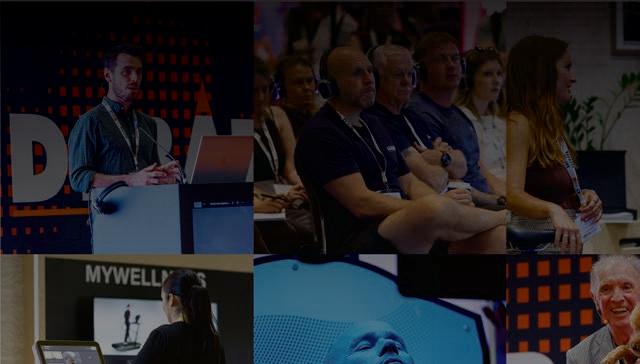
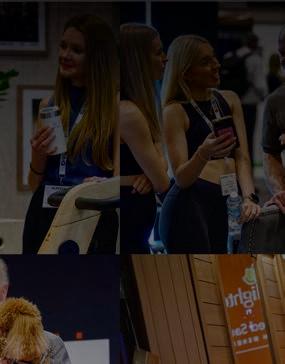
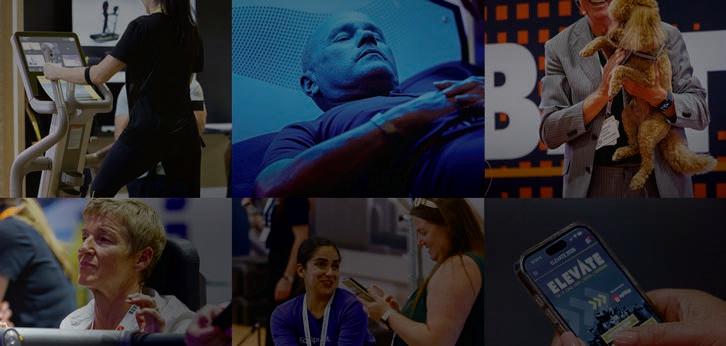




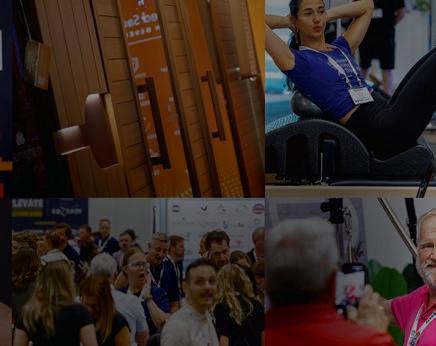

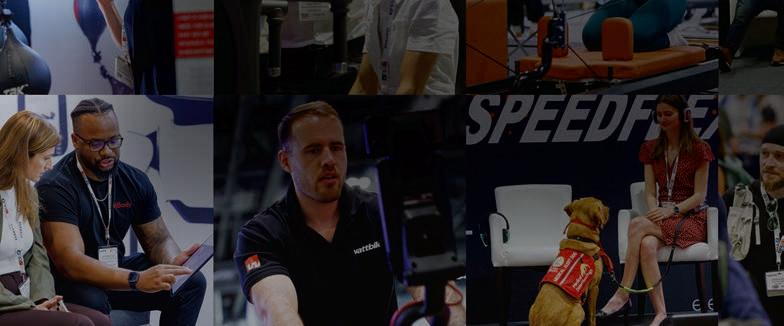
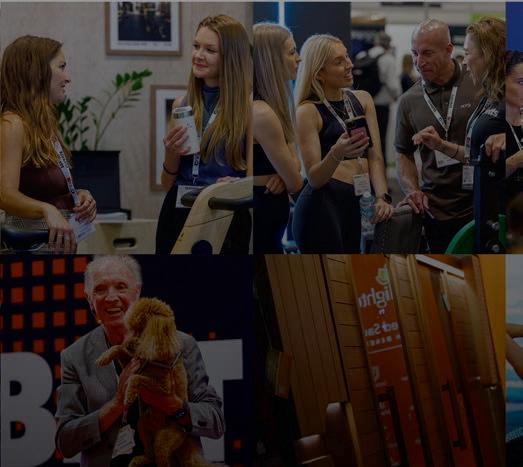




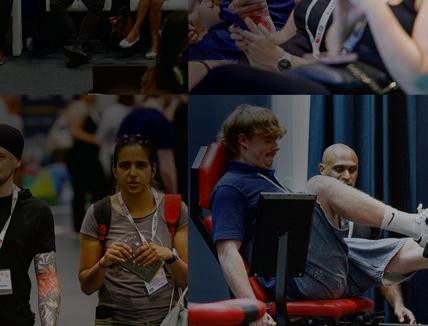
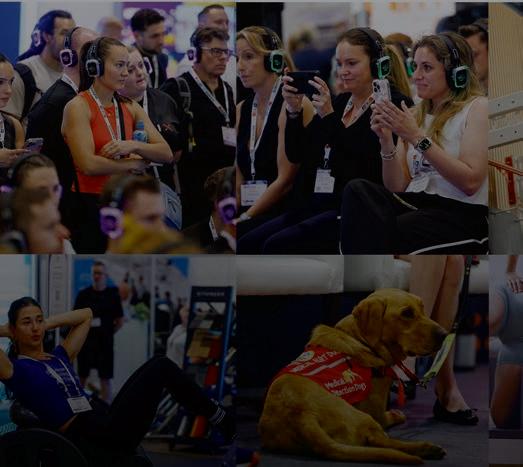


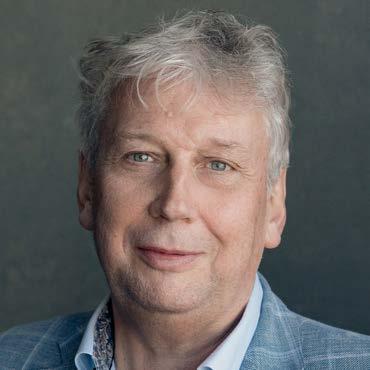
Returning as ukactive Chair, David Stalker says the physical activity sector has a generational opportunity to drive change together
When David Stalker talks about the physical activity sector, it’s with the perspective of someone who has lived through its every major evolution. Having started as a part-time fitness instructor at the Royal Berkshire Club in 1989, his 35year career in the industry spans private operators, local authority leisure centres, global suppliers and policy bodies. He currently sits on a number of boards for a wide variety of businesses and was, until recently, also the president of EuropeActive.
As the newly appointed Chair of ukactive, he returns to an organisation whose evolution he played a major role in. As CEO, in 2012 he led the transformation of the then Fitness Industry Association (FIA) into what ukactive is today – a broader, more inclusive voice for the entire activity sector. Since then, the organisation has evolved further and led the sector through a series of global crises, from the Covid pandemic to the energy
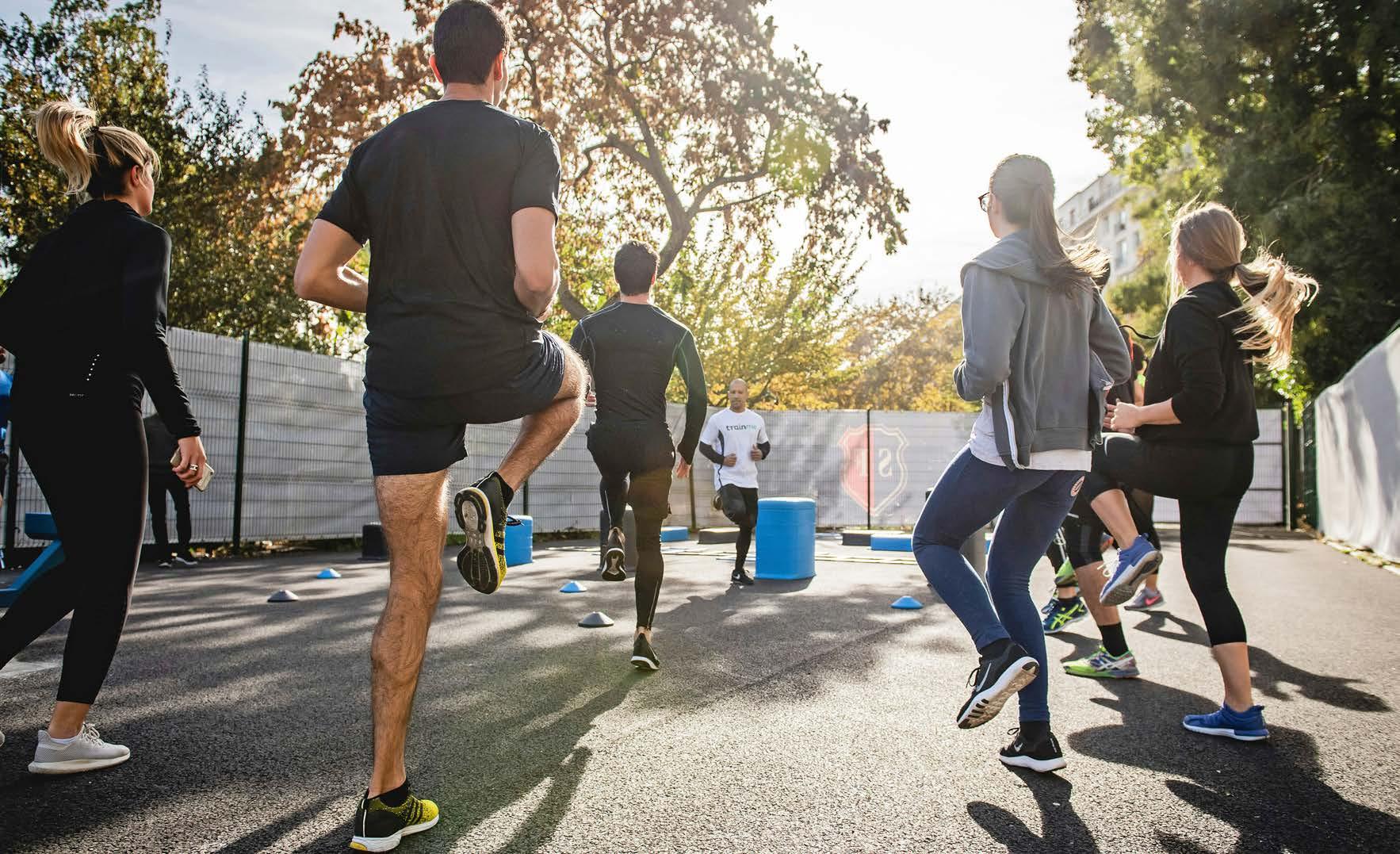
crisis, with both the public and private sector sharing common challenges. Now, Stalker returns to help shape the next phase of its evolution. This time as Chair, he is armed with a clear message: it’s more important than ever for the industry to unite and work together.
“It feels a bit like coming home,” he tells WellNation. “I’ll always feel like a surrogate father to ukactive. I was CEO of the team that made the move from the FIA to ukactive, and I’ve always wanted to see it thrive. The people in this sector – whether they’re happy or frustrated – want the same thing: they want it to work. That excites me.”
For Stalker, the sense of unfinished business is strong. When he oversaw the FIA’s evolution more than a decade ago, the goal was to unite a fragmented sector. Then, the challenge was persuading fitness,

leisure and sport organisations – many with their own associations, priorities, and politics – to speak with one voice. It was challenging and exciting work, but essential, he says, to gain influence in government.
“If four people are speaking separately, it’s easy to ignore them all,” he reflects. “But when one voice represents everyone, you have to listen. That was the whole point of ukactive: uniting behind a single message.”
Now, Stalker believes that unity will be crucial to capitalise on the generational opportunity the sector has to drive change. He says that while there has never been a stronger, shared belief in the industry’s importance to the nation’s health, in some quarters, there has been disagreement on how to best represent it. “Everyone wants ukactive to work,” he adds, “and if anyone feels their part of the sector isn’t being heard, we will change that.”
While his predecessor, Mike Farrar – a former CEO of the NHS Confederation – brought deep expertise from the health sector, Stalker brings a lifetime within the industry itself. That experience, he says, will shape his priorities for the next chapter at ukactive.
“This is a very different moment,” he explains. “Mike and others before him had the right backgrounds for their time – opening doors in health and politics. Right now, the sector needs to come together. It’s not about personality; it’s about consolidation and focus.”
That means listening first. When asked what his priorities as Chair will be, Stalker is cautious not to determine priorities before consulting widely. His first task, he says, is to speak with stakeholders across all corners of the industry: private operators, trusts, suppliers, independents, training providers, policy partners and the workforce.
“My first priority,” he says, “is to listen – and to listen to everyone. We need to identify three or four goals that everyone can unite behind. They need to be measurable, realistic and relevant across the whole sector. Once we have that, we can move forward together.”
These goals, he suggests, will likely centre around health, but their exact form will depend on the consultation process. “We might not hit them all,” he adds, “and that’s okay. What matters is openness – acknowledging where we are, what’s working and what isn’t. Transparency and honesty are the only ways we’ll build real unity.”
“I would, however, like to emphasise that an awful lot has happened at ukactive over recent years to drive the sector forward – from securing the £100m National Leisure Recovery Fund, to meeting the demand from operators for credible sector-wide market reporting and research and establishing The Active Standard.”
If there’s a theme running through Stalker’s comments, it’s the strength of the founding principles of ukactive – the reasons for rebranding from FIA.
“When we created ukactive,” he says, “we wanted to move from fitness to physical activity and health. ‘Fitness’ can feel exclusive to some people; ‘activity and health’ opens the door to everyone. We need to ensure that inclusivity and remember why we exist: to get more people more active.”
That mission, he insists, remains vital. “No one can deny that driving the health of the nation forward impacts everything – from the NHS to the armed forces. But we’ll only be listened to if we’re united behind that message.”
Having spent almost 40 years in the sector, Stalker has witnessed its transformation firsthand. His own journey in the sector, however, was not planned. Born and raised in Kenya, he moved to the UK in the late 1980s with a passion for wildlife conservation.
“David Attenborough got my job, so I had to find something else,” he jokes. “My childhood, like many born
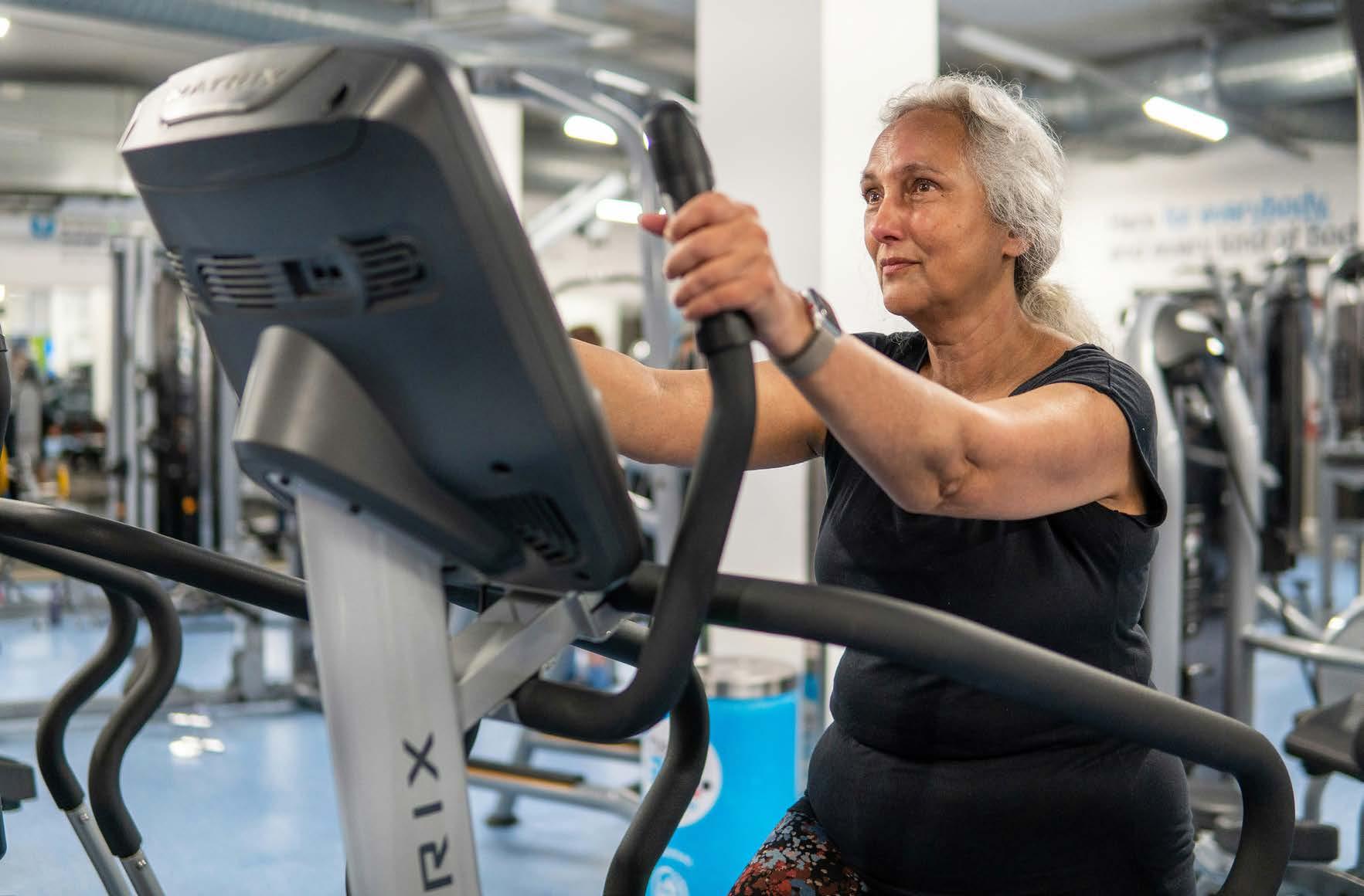
and brought up in Kenya, was always outdoors – very active and full of sport. So when I moved to the UK, I naturally gravitated towards the emerging market of health and fitness and became a fitness instructor at the Royal Berkshire Club and discovered a new passion.
“I didn’t plan a career in this industry,” he says. “But I fell in love with it quickly. I’ve been lucky to experience the whole journey – from fitness to health, from gyms and leisure centres to wellness and prevention.”
That evolution, he says, has been dramatic. From the dominance of big-box gyms and public leisure centres in the 1990s and 2000s, the industry has since diversified, embracing affordable fitness, boutique studios,

digital platforms and now hybrid wellness models.
“In the UK and Europe, we used to follow the US,” he says. “Now, we lead in many ways – in marketing, experience and innovation. The affordable sector has transformed access; younger generations see health as a priority, not a luxury. That’s a massive cultural shift.”
Technology, too, has reshaped the landscape. “When I started, the equipment consisted of lines of cardio and resistance machines. Now, you’ve got functional training, data tracking, recovery, nutrition, mental wellbeing – all integrated. It’s a different world.”
But he warns against being dazzled by data. “I’m wearing a Myzone belt, an Apple Watch
and a data ring,” he laughs. “But at what point does the information stop being useful and start being noise? The challenge now is to make sure technology enhances behaviour, not replaces it.”
One of the sector’s biggest emerging challenges, Stalker says, is how to respond to the rise of GLP-1 weight-loss drugs such as Ozempic and Mounjaro. He sees both threats and opportunities.
“For the sector, it’s potentially a Trojan horse,” he says, “an opportunity to connect with healthcare like never before – but only if we do it right.”

On the other hand, he worries about misuse and misinformation, particularly on social media.
“There’s a real risk that something developed for type 2 diabetes becomes another tool of vanity,” he cautions. “We’ve worked hard to promote positive body image and healthy living. We can’t let that be undone. But if we harness it correctly, this could be a gateway to engage millions more people in physical activity.”
Strengths, challenges – and a shared mission Stalker’s optimism about the sector’s potential is rooted in people. “Our biggest strength is our people,” he says without hesitation when asked about the industry’s strongest point. “At every level – receptionists, trainers, managers, CEOs – there’s a passion to make a difference. I don’t think any other industry cares as much.”
Stalker believes that the sector’s diversity can be its strength rather than a weakness. “Our challenge is that everyone’s driven by slightly different missions,” he explains. “A local authority operator wants to serve communities; a private club wants to serve its members and grow revenue; a supplier wants to innovate. None of those aims are wrong, but we need to see how they fit together. Like pieces of a jigsaw: individually they’re incomplete, but together they form a powerful picture.”
A Chair for the moment
Stalker is candid about his role. “In the future it might be right for a high-profile figure from health or politics to take the chair again. But for the foreseeable future, this is about building unity and focus. We need to do fewer things, better.”
He’s equally clear about ukactive’s place in the wider ecosystem. “We’re a small industry in geopolitical terms,” he says. “We can’t expect to be at the top of every government agenda overnight. But when we’re united, we have enormous influence. We proved that once, with the pandemic – and we can do it again.”
His leadership style, he says, will be pragmatic and inclusive. “I’m not here to be the loudest voice in the room,” he concludes. “I’m here to make sure everyone’s voice is heard and that we’re all speaking the same language.”
For those who know Stalker’s history in the sector, that may sound familiar. Thirteen years after helping create ukactive, he’s back to ensure it stays true to its founding purpose.
“We’ve come full circle,” he says. “Now it’s about focusing on that shared belief that we can deliver a healthier, happier nation by getting more people, more active, more often.”
Leisure DB’s Monthly Market Tracker lets you quickly identify and respond to new opportunities in the market and on your doorstep.
Each month, we round up key developments in the UK gym market: openings and closures, planning updates, proposed expansions, rebrands, management changes and more.
Keep your finger on the pulse and your business one step ahead.
Find out more and download a free sample report: leisuredb.com/market-tracker
In September, CIMSPA held its first conference since February 2020. WellNation was among the 300 delegates that gathered to discuss the multitude of complex health, economic and social challenges facing the sector
The Chartered Institute for the Management of Sport and Physical Activity (CIMSPA)’s first conference for five years was held at the King Power Stadium in Leicester on Wednesday 24th September. The event attracted more than 300 delegates and 20 exhibitors. With a theme of ‘connecting the dots’, the conference spotlight was placed firmly on the role that the sport and physical activity workforce plays in tackling some of the biggest challenges that the country faces and how, through innovation and collaboration, the crucial work that the sector workforce delivers can have impact at scale. The thought-provoking programme included keynote speakers, expert panels and a choice of breakout workshops covering topic areas such as health and active wellbeing, education and career development, workforce planning and management, and inclusive participation.

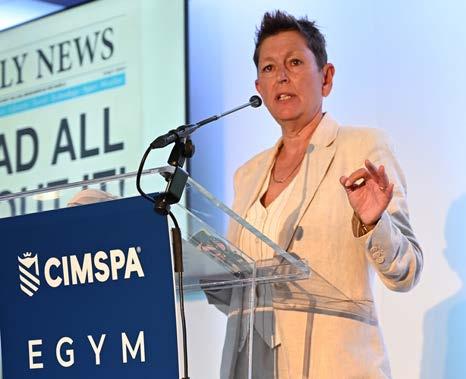
The introduction of professional status marks a huge opportunity for the sector’s workforce to be formally recognised by peers, allied sectors, and the public
The day began with a welcome from CIMSPA CEO Tara Dillon, who spoke candidly about the challenges the sector has faced since 2020, and how the recent introduction of professional status for the workforce represented a huge opportunity for professionals to be formally recognised by their peers, allied sectors, and the general public. Next to take the lectern was Will Watt, founder of social value and wellbeing economics consultancy State of Life, who passionately advocated for the use of data to support wider recognition of the true value of physical activity and how it can be used as a key driver to influence investment and policy decisions at the highest level.
Post-lunch and networking, CIMSPA’s Director of Professional Services, Communications and Engagement, Annette Wade-Clarke invited
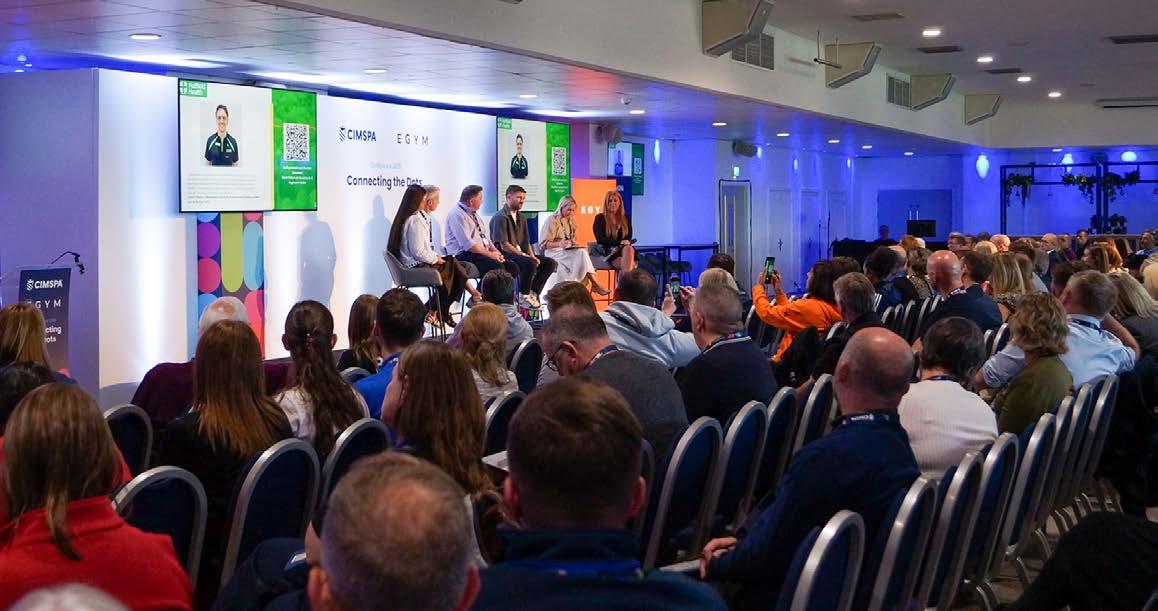
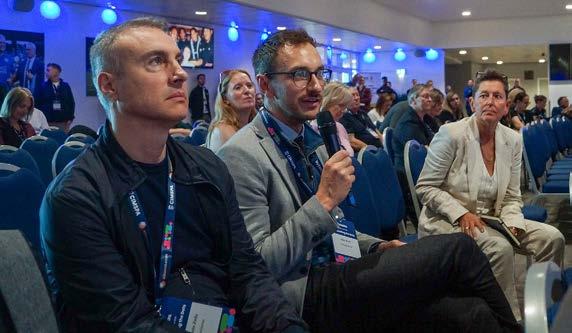
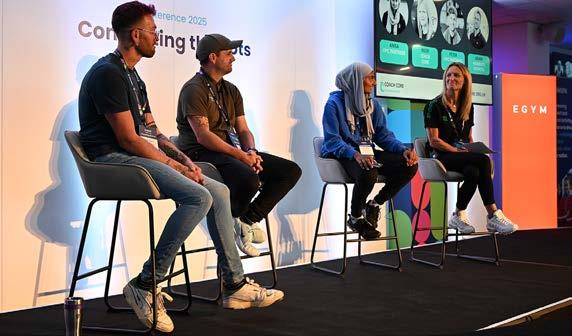
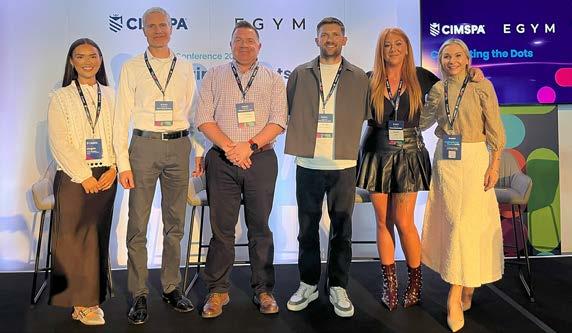

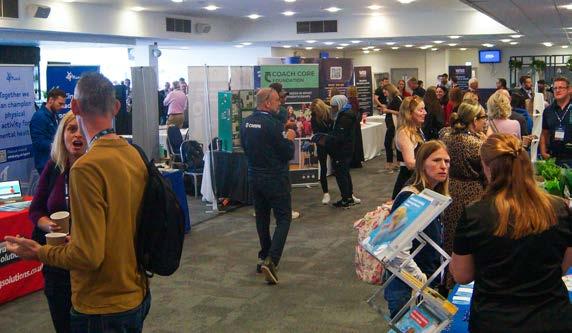
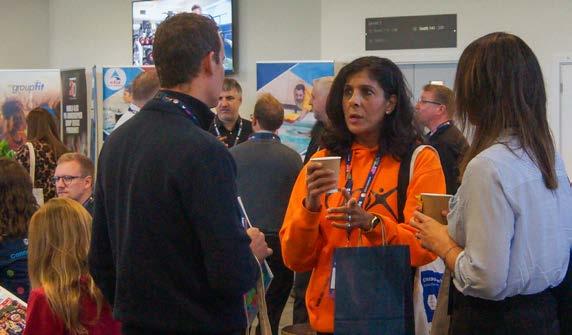
broadcaster, writer and women’s health expert Dr Nighat Arif to the stage for what was an inspiring, insightful and open conversation on how system change is needed to improve how women and girls are trained in a sport and physical activity environment, with more tailored learning and specialised delivery required to help expedite the move away from outdated methods that are traditionally based on the male body.
The day’s final speaker was Matt Hampson OBE, former professional rugby player and founder of the Matt Hampson Foundation.
The former England Under-21 international’s inspirational talk was an impactful and emotional way to round off the day, as he described his journey from a rugby-mad youngster to his dream job as a professional, and how a freak, life-changing changing accident on the rugby field left him paralysed from the waist down. Hampson then moved on to his journey of recovery and self-reflection, which led him to create the foundation, which now inspires and supports new generations of young people who are seriously injured through sport.
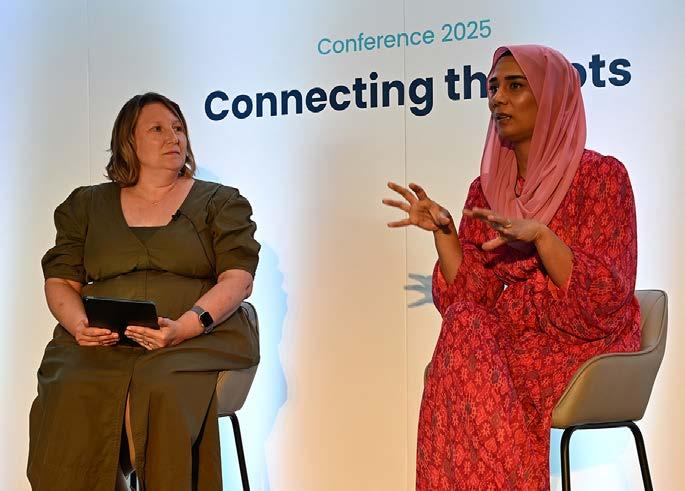
We need system change to move beyond outdated, male-based training methods for women and girls
His praise for the support of the rugby community was evident throughout, whilst foundation staff members in the audience were also eager to share their own personal stories that led them to be working alongside Hampson.
After leading the subsequent Q&A session with Matt, Tara Dillon then closed the event with a rallying call to turn the day’s conversation into connection, and connection into lasting change for the sector.
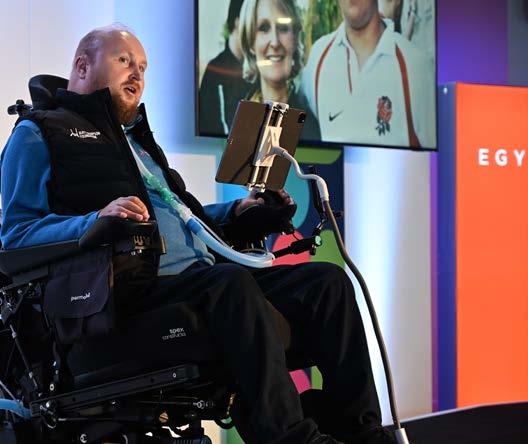
Hampson’s story inspired a room to turn conversation into lasting change
Speaking after the event, Clare Dunn – Associate Director of Business Engagement at CIMSPA, said: “The industry has been through so many changes since our last conference, back in February 2020, and with professional status being launched the week before this conference, it felt like the perfect time to bring everyone together to explore the complex health, economic and social challenges that the sector currently faces.
“It was fantastic to see so many professionals representing all areas of the sector in the one building, all eager to discover insight and inspiration to help them elevate and amplify the impact of sport and physical activity in the UK, and the feedback we’ve received after the event has all been incredibly positive.
“We’d also like to thank our headline sponsor EGYM UK and our other event sponsors Alliance Leisure, myFitApp, IndigoFitness and the Welsh Sports Association (WSA) for their support in helping to make the day such a success.”
CIMSPA have yet to announce their plans for a 2026 event, but those interested have been advised to keep an eye on the CIMSPA website and social media channels for the latest updates around future events https://www.cimspa.co.uk



Secondary spend and maximising passive income were among the topics discussed in detail at this year’s active-net Scotland event
The picturesque Crieff Hydro played host to active-net Scotland 2025, a one-day networking event designed exclusively for the fitness and leisure sector. Known for its highly focused format, active-net once again delivered a unique opportunity for buyers and suppliers to connect through a combination of seminars, structured meetings and informal networking. Bringing together decision-makers from across Scotland’s leading leisure organisations, including Edinburgh Leisure, Inverclyde Leisure, New College Lancashire and University of Glasgow Sport, the event provided suppliers with direct access to those who shape the industry. Companies such as HireBOB.ai, Taylor Made
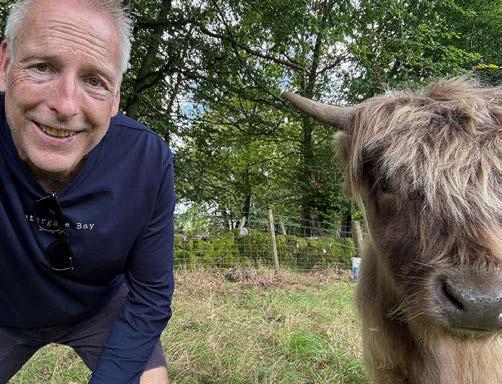
Designs, Future Fit for Business and The ASA showcased innovative products and services designed to help operators enhance performance, efficiency, and customer experience.
The day began with a Keynote Panel chaired by David Monkhouse, which set the tone for the event. The discussion centred on the crucial theme of “Generating recurring income and secondary spend”, a topic increasingly vital for leisure operators navigating financial pressures and evolving customer expectations. Panel contributors included Active Insight’s Julie Allen, CIMSPA’s Megan Richardson, ukactive’s Claire Place, The Scottish Leisure Network Group’s Alan Cunningham and Community Leisure UK’s Kirsty Cumming. Each brought their own perspective on sustainable growth and diversification of

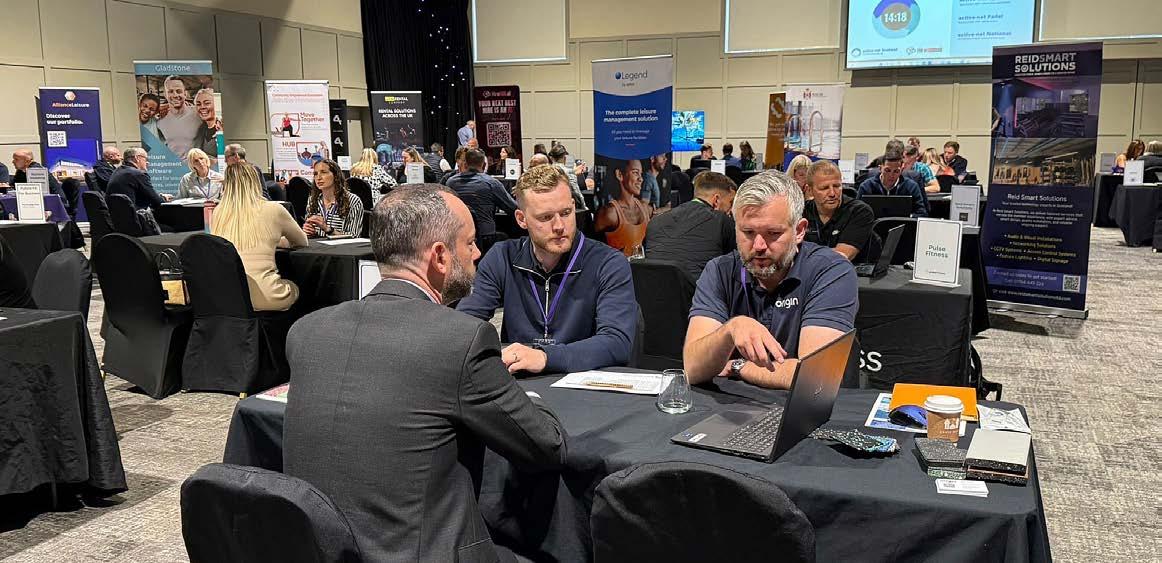
The quality of discussion and the e ciency of the format continue to set active-net apart from other networking events
income streams, providing delegates with both inspiration and practical takeaways.
From there, attendees split into two parallel workshops, each designed to dig deeper into the themes of the keynote. The first, also led by David Monkhouse alongside James Taylor (Taylor Made Designs) and Ross Black (Sportmax), focused on “Passive income and secondary sales”. Delegates explored innovative approaches to driving revenue that enhance the member experience.
Running alongside this was a session chaired by Julie Allen on “Data and insight to inform passive income and secondary sales”. This workshop, supported by Claire Place of ukactive and Inverclyde Leisure’s Robert McVitie, highlighted the increasing role of data in shaping customer engagement and improving decision-making.
After a morning of learning, delegates embarked on what makes active-net truly distinctive, a schedule of one-to-one meetings between buyers and suppliers. These pre-arranged conversations allowed suppliers to showcase solutions tailored to the exact needs of operators, while buyers gained access to new ideas and partnerships with minimal time wasted…it is effectively business speed dating! The quality of discussion and the
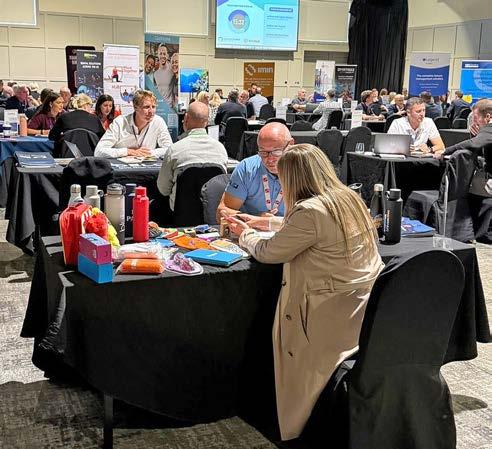
efficiency of the format continue to set activenet apart from other networking events.
The day concluded with a relaxed open networking session, followed by an always lively group exercise class, a fitting way to end the event. Delegates then enjoyed an evening meal and overnight accommodation, ensuring plenty of opportunity to strengthen the new connections made throughout the day.
After a strong mix of education, structured meetings and informal networking, delegates left with actionable insights, valuable contacts and fresh opportunities to enhance their organisations. Attention now turns to upcoming events, active-net Open Water at Holme Pierrepont Nottingham on 15th October, and active-net Padel (North) at Bolton Arena on 3rd December. To find out more visit active-net.org.
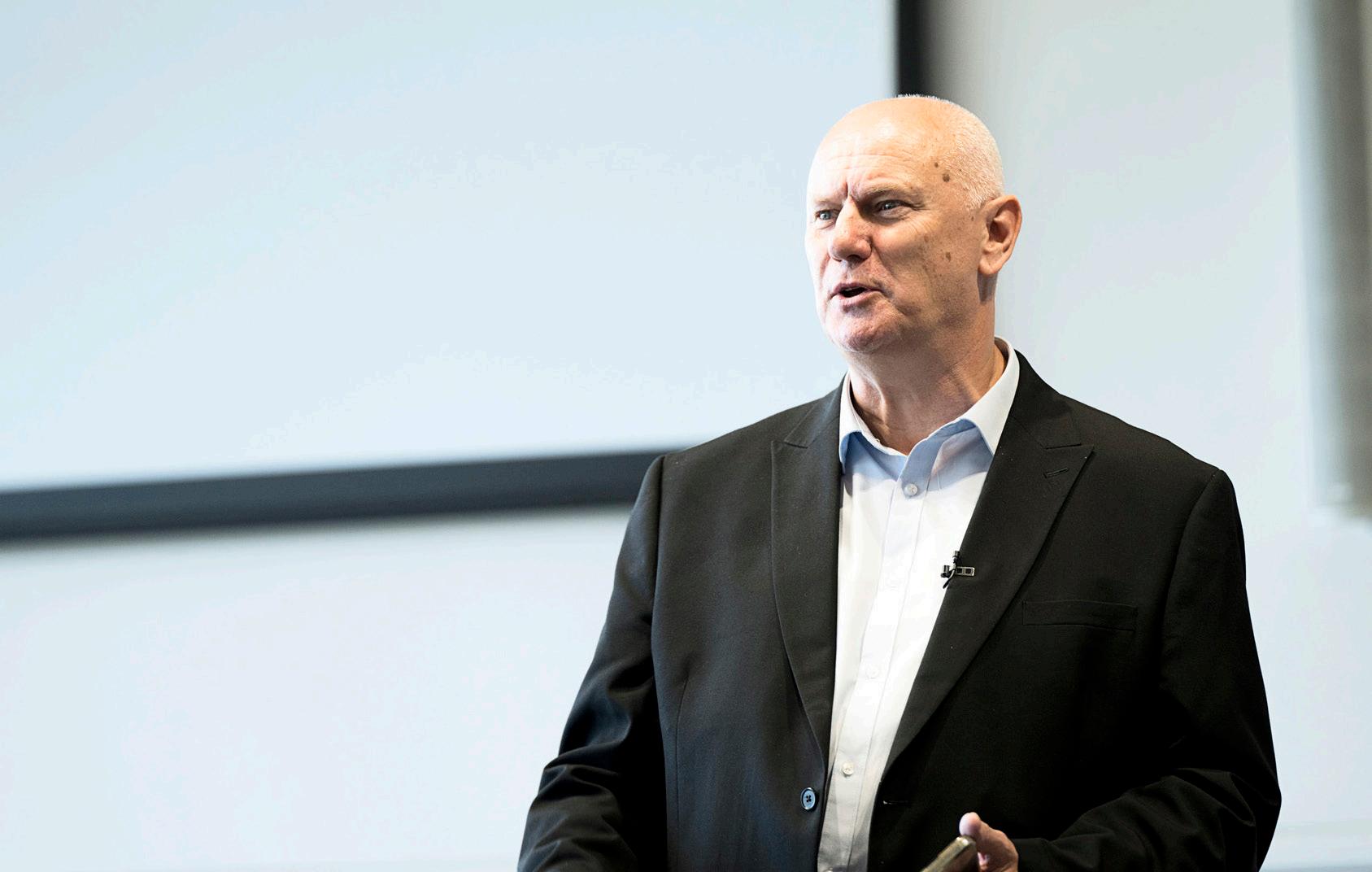
This year’s edition of the Retention Convention looked to arm delegates with insights which would help them harness data and to drive behaviour change in fitness
More than 150 senior professionals from across the fitness and physical activity industry gathered at The Slate Conference Centre, University of Warwick, on 25 September for the Retention Convention 2025. The invite-only event, hosted by Dr. Paul Bedford, focused on this year’s theme, “Using Data to Change Behaviour”. The one-day conference highlighted how data-driven strategies can improve member retention and boost commercial performance across health, fitness, and leisure sectors.
The convention offered a dynamic programme of keynote sessions, led by prominent figures in exercise science and fitness management. Dr Melvyn Hillsdon, Associate Professor of Exercise & Health
Behavioural data is the key to understanding members, improving adherence and creating lasting results
Behaviour at the University of Exeter, explored how behavioural data can drive engagement and improve adherence. Stuart Stokes, founder of ReferAll, showcased strategies that enable operators to better understand and respond to member needs.
Building on their insights, a panel of industry experts – Rachel Rinkcavage from Barnsley Premier Leisure, Kira Mahal from MotivatePT and Tiffeny Gauld from LeisureLabs – discussed practical ways to leverage data to enhance retention and boost commercial performance. Adding further inspiration, TIME co-founders, Nick Mennell, Keith Smith, and Dave Swis, delivered a thought-provoking session that challenged conventional induction processes, advocating for a more holistic, thorough, and personalised approach to onboarding new members.
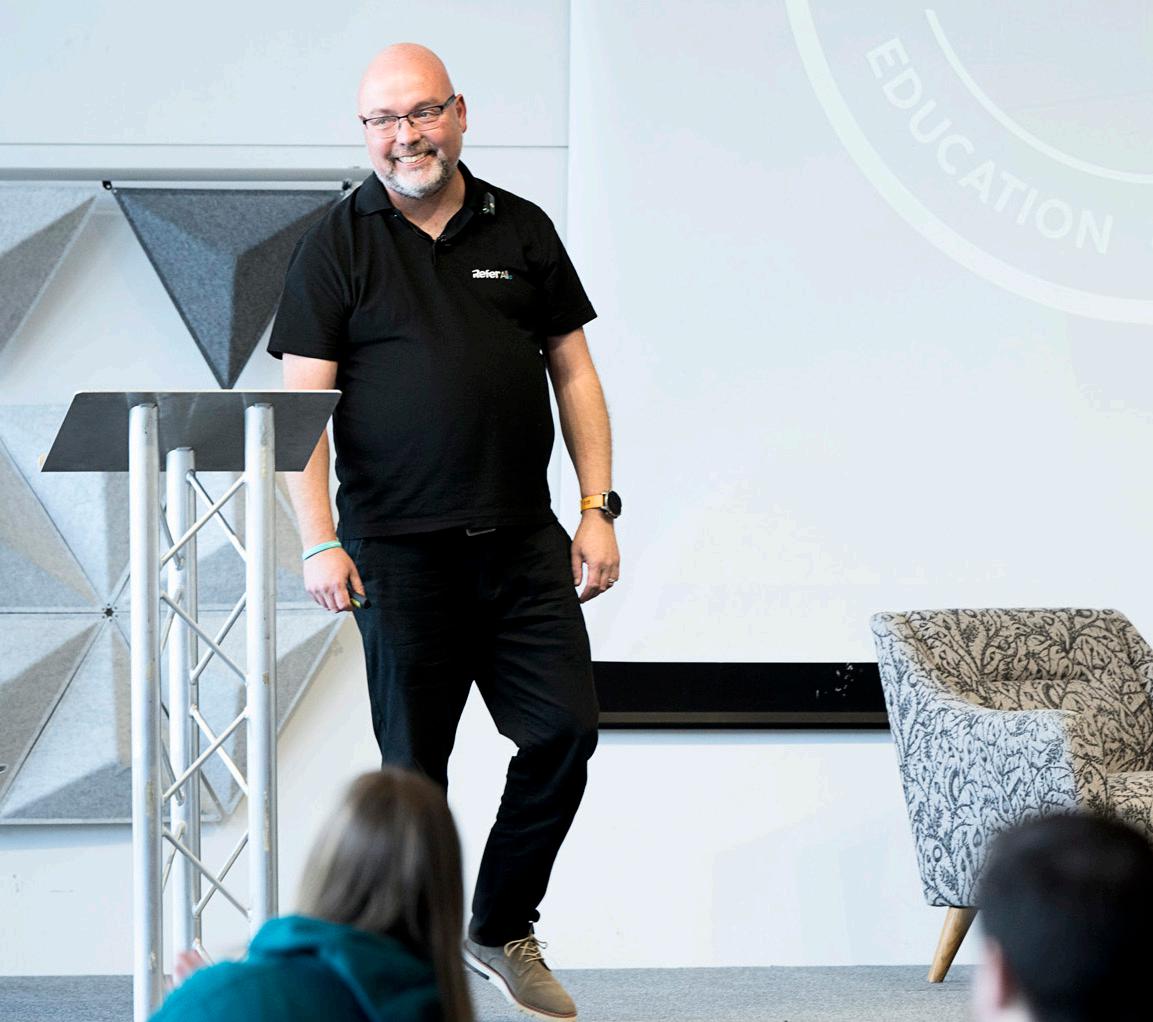
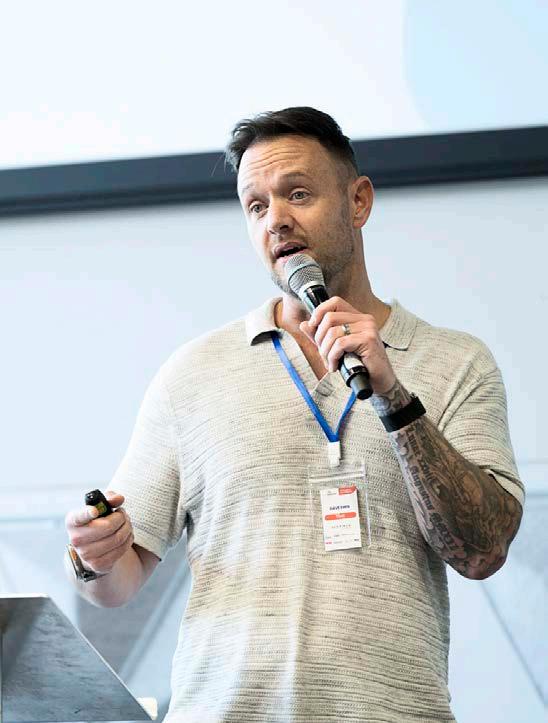
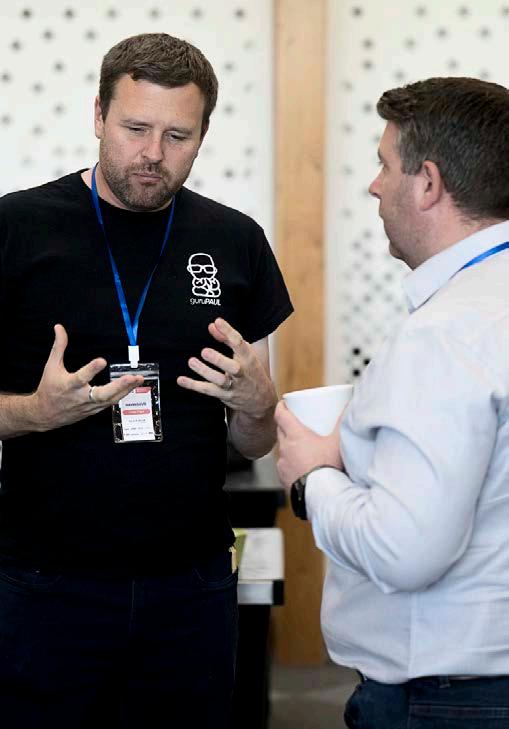
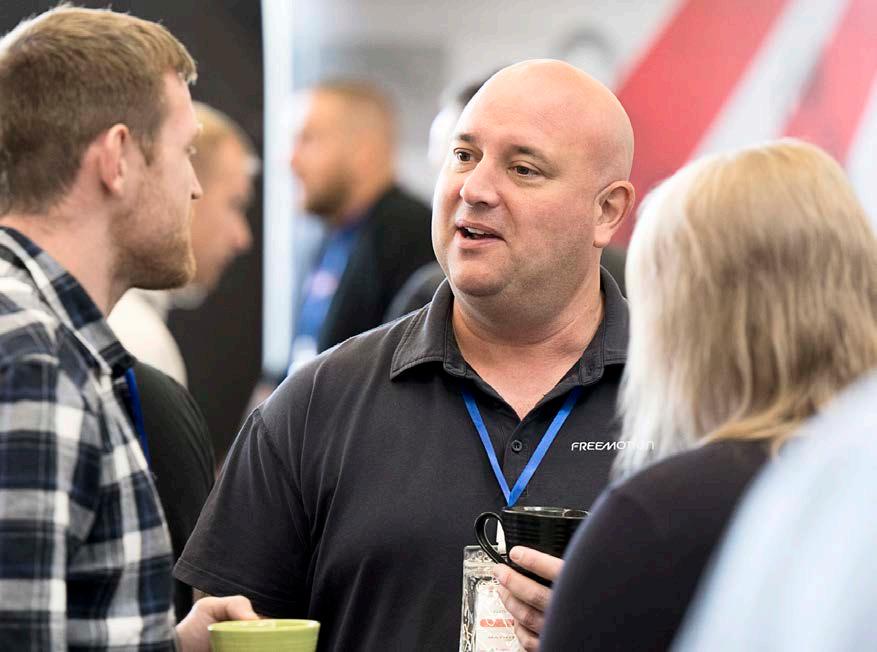
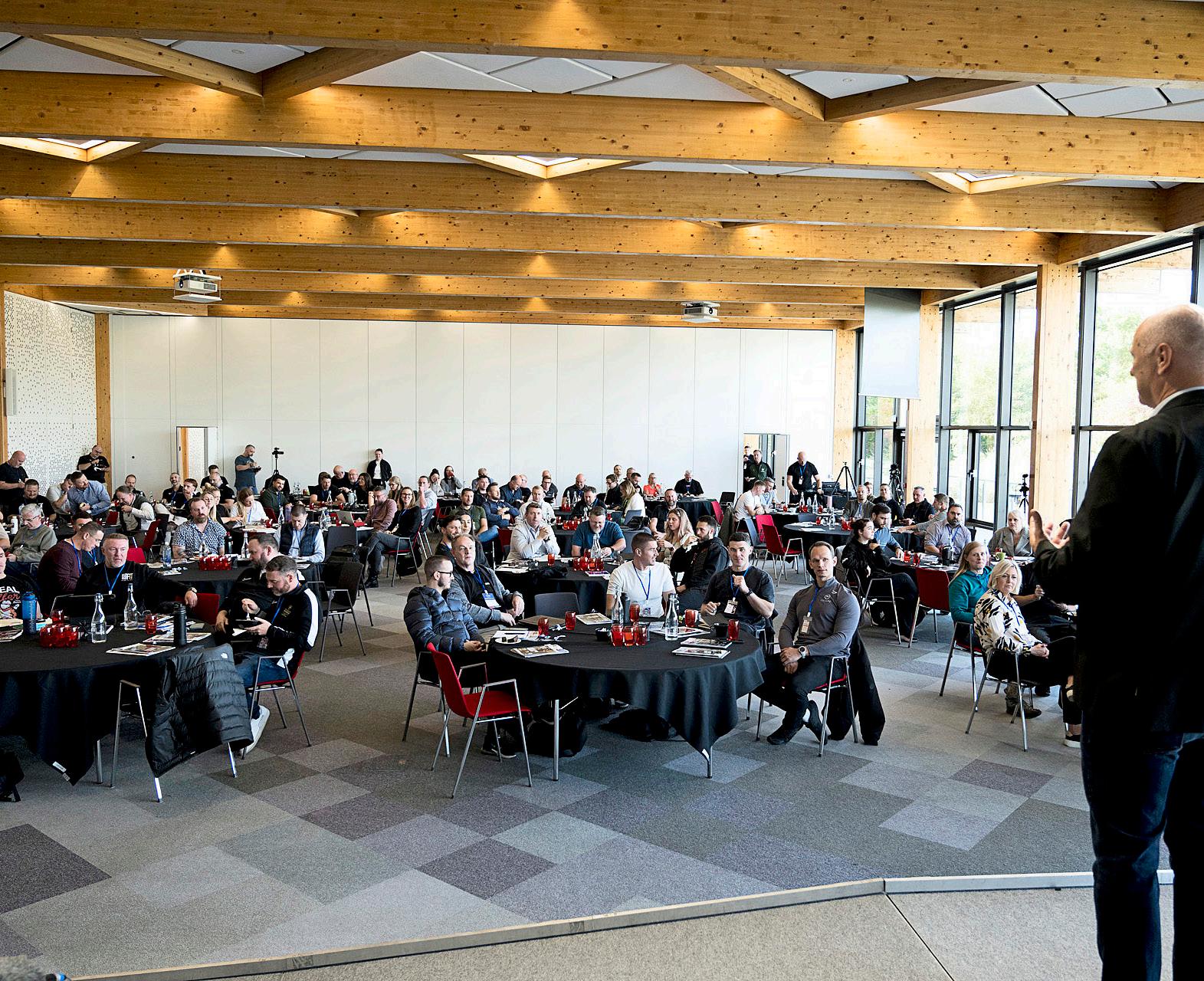
Matrix Fitness UK was this year’s lead partner for the event, demonstrating their commitment to knowledge-sharing and innovation in the sector. Additional partners included Pocket Rocket Group, Inbody UK, TIME, Wattbike, Your Personal Training Ltd, and GuruPaul - all helping to create a collaborative environment that connected senior professionals across public and private operators, higher education, and global fitness brands.
Beyond the conference sessions, attendees were treated to a tour of the University of Warwick’s state-of-the-art gym facilities, offering handson insight into cutting-edge fitness equipment and training environments. The tour reinforced the practical application of the strategies discussed during the day and offered delegates an opportunity to see innovative approaches to engagement and member experience in action.
The Retention Convention 2025 successfully brought together diverse voices across the industry, combining academic research, technology innovation and operational expertise to highlight the power of
Partnerships across public, private and academic sectors are driving a new era of data-led decision making in fitness
data in shaping member behaviour. Attendees left with actionable strategies, fresh ideas for improving retention, and valuable networking connections to help drive success in their own organisations.
As the fitness sector continues to evolve, events like the Retention Convention demonstrate the growing importance of data-driven decision-making through creating meaningful member experiences that resonate. For more information on the Retention Convention, contact paul@retentionguru.co.uk


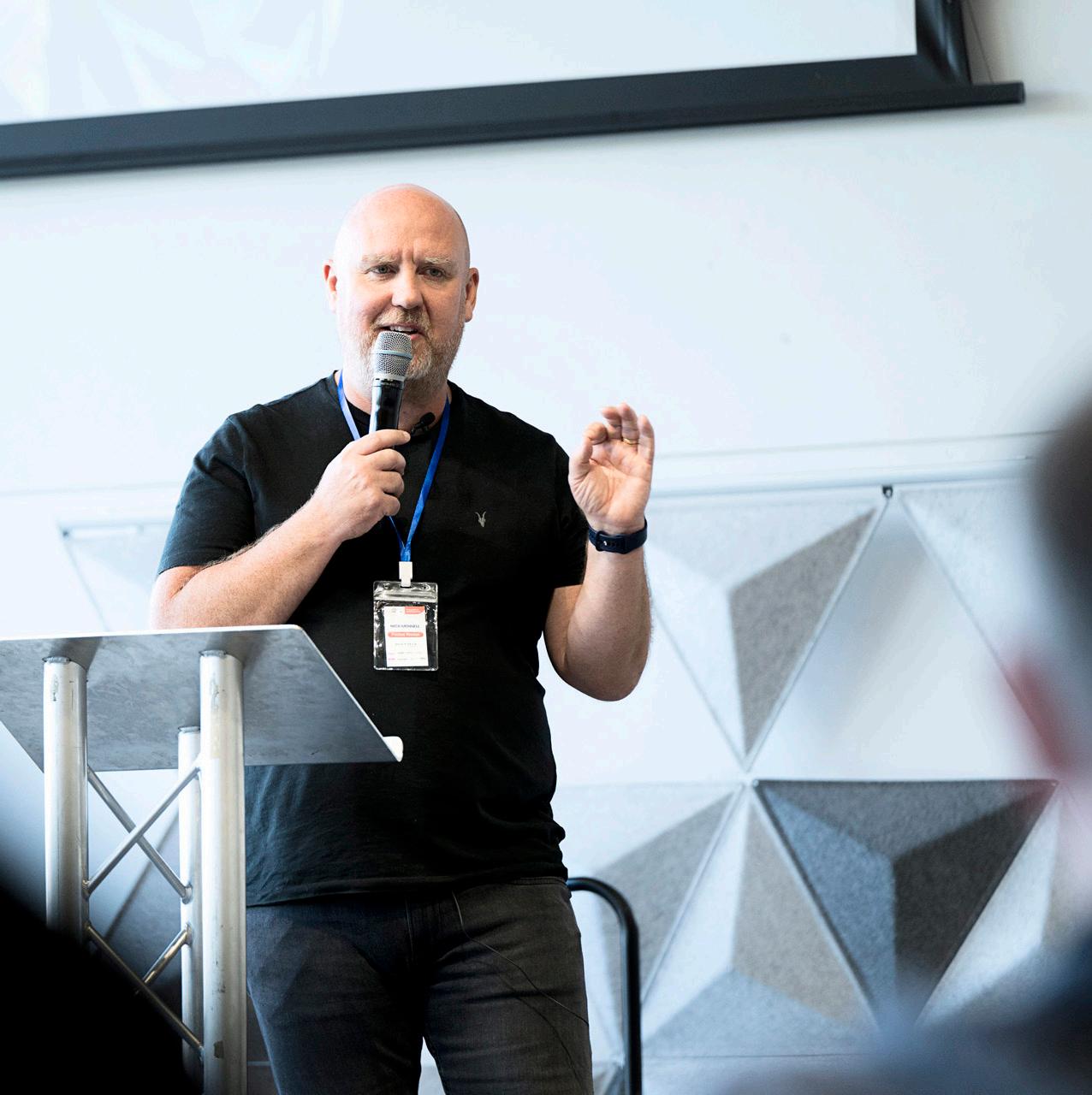
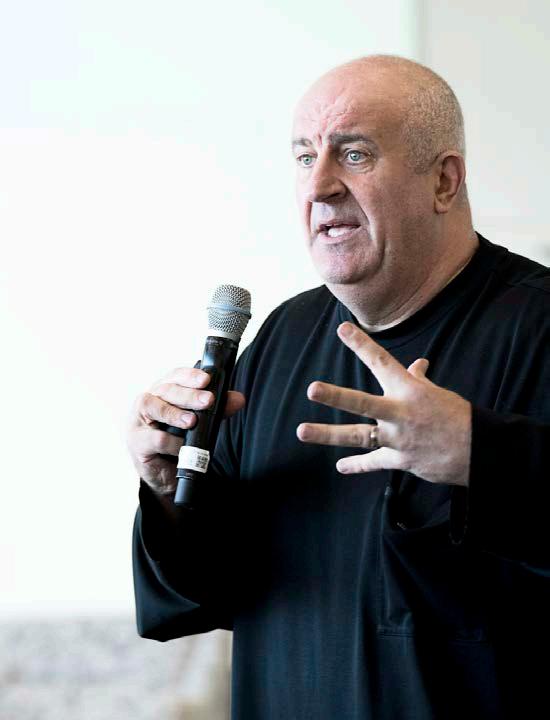



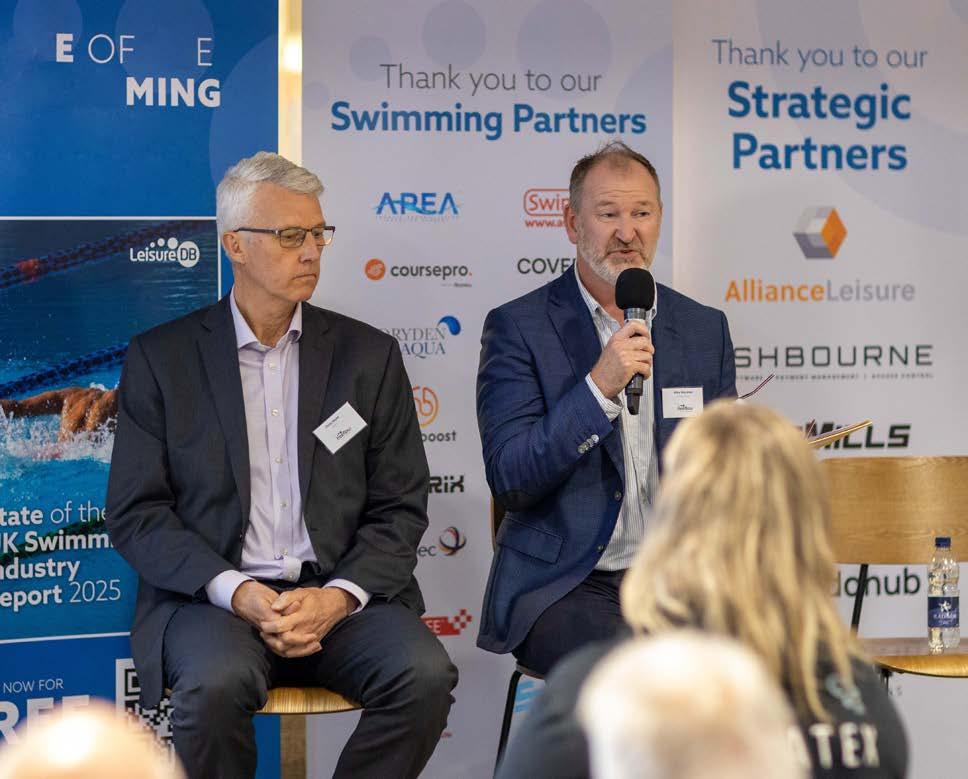
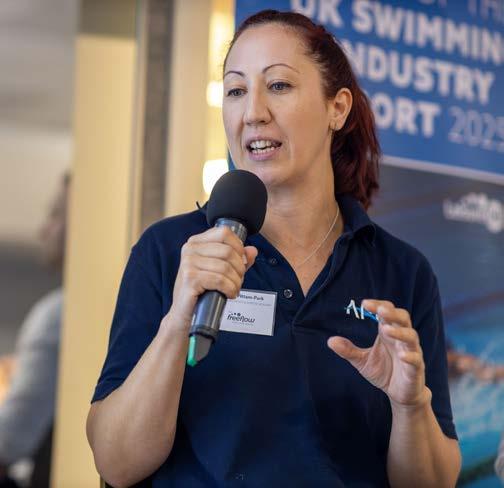



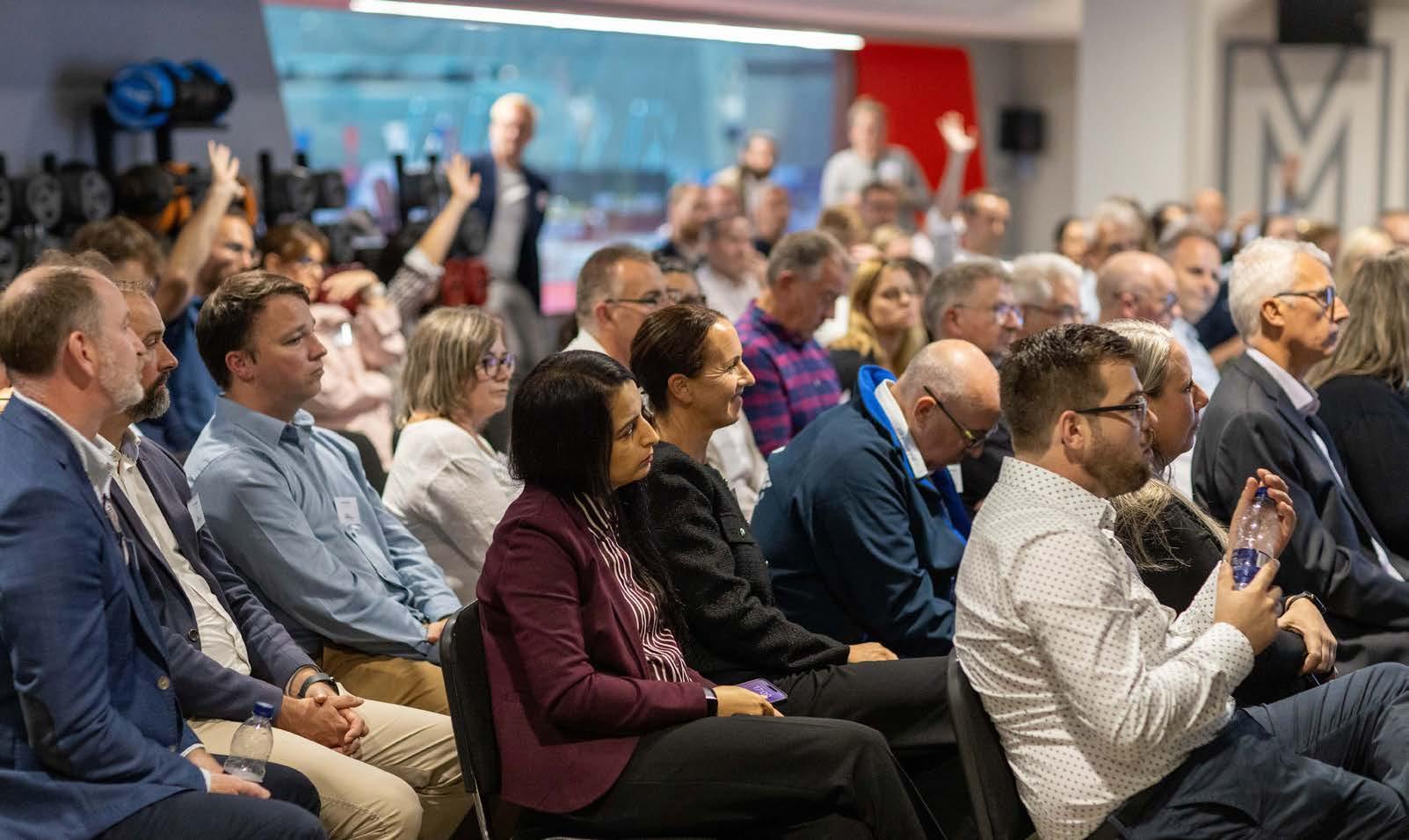







WellNation reports from the Free��ow Swim Conference 2025, which has become one of the leading events for the UK aquatics sector
The Freeflow Swim Conference 2025, hosted by Leisure DB at the iconic London Aquatics Centre on 18 September, was hailed as a milestone gathering for the UK’s swimming community. Drawing leaders from across sport, health, and leisure, the event combined robust data from Leisure DB’s State of the UK Swimming Industry Report 2025 with inspiring discussions, underlining both the challenges and the potential of the nation’s pool network.
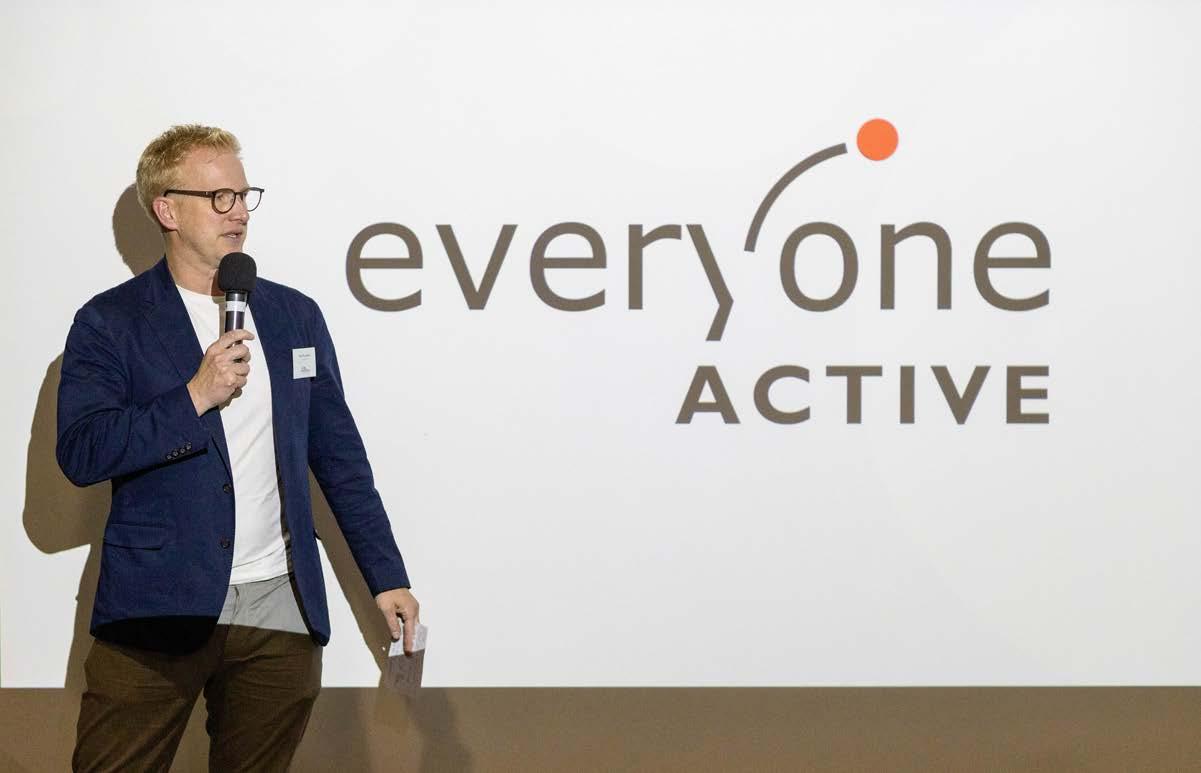

Diverse voices, shared purpose
The conference programme brought together a remarkable range of voices. From Olympic champion Becky Adlington (Swim!) to senior leaders from Swim England (Andy Salmon), the STA (Dave Candler), and RLSS UK (Simmy Akhtar), attendees heard perspectives spanning grassroots participation, safety and elite performance.
Key sessions included:
State of the UK Swimming Industry –
Key progress from the figureheads of the governing bodies and leading operators.
Neurodiversity and Swimming – A powerful discussion on inclusion and accessibility.
Utilising Secondary Spend – Insights into diversifying revenue and building resilience.
Energy Costs: What’s the Cure? – Practical solutions to one of the sector’s biggest challenges.
Programming for Success – Examples of creative approaches to maximising pool usage.
A venue fit for the occasion
The choice of the London Aquatics Centre, a legacy of the 2012 Olympic Games, added symbolic weight to the day. The venue’s world-class setting provided a fitting backdrop for conversations about safeguarding swimming for future generations, reminding delegates of both the sport’s proud history and its ongoing potential.
Looking forward with optimism
While acknowledging the ongoing decline in pool stock, the Freeflow Swim Conference struck an optimistic note. The combination of candid data, expert insight, and passionate advocacy created a platform not only for reflection but also for momentum.
As the conference concluded, the message was clear: swimming matters; for health, for safety, and for communities. By bringing together diverse stakeholders in such a dynamic and celebratory forum, Leisure DB ensured that the Freeflow Swim Conference 2025 will be remembered as a turning point in the campaign to protect and grow the UK’s pool provision.
“The Freeflow conference is more than just an event – it is a platform for collaboration, knowledgesharing, and progress,” said LeisureDB’s David Minton. “It explores the future of swimming and aquatics within the fitness and leisure sector.
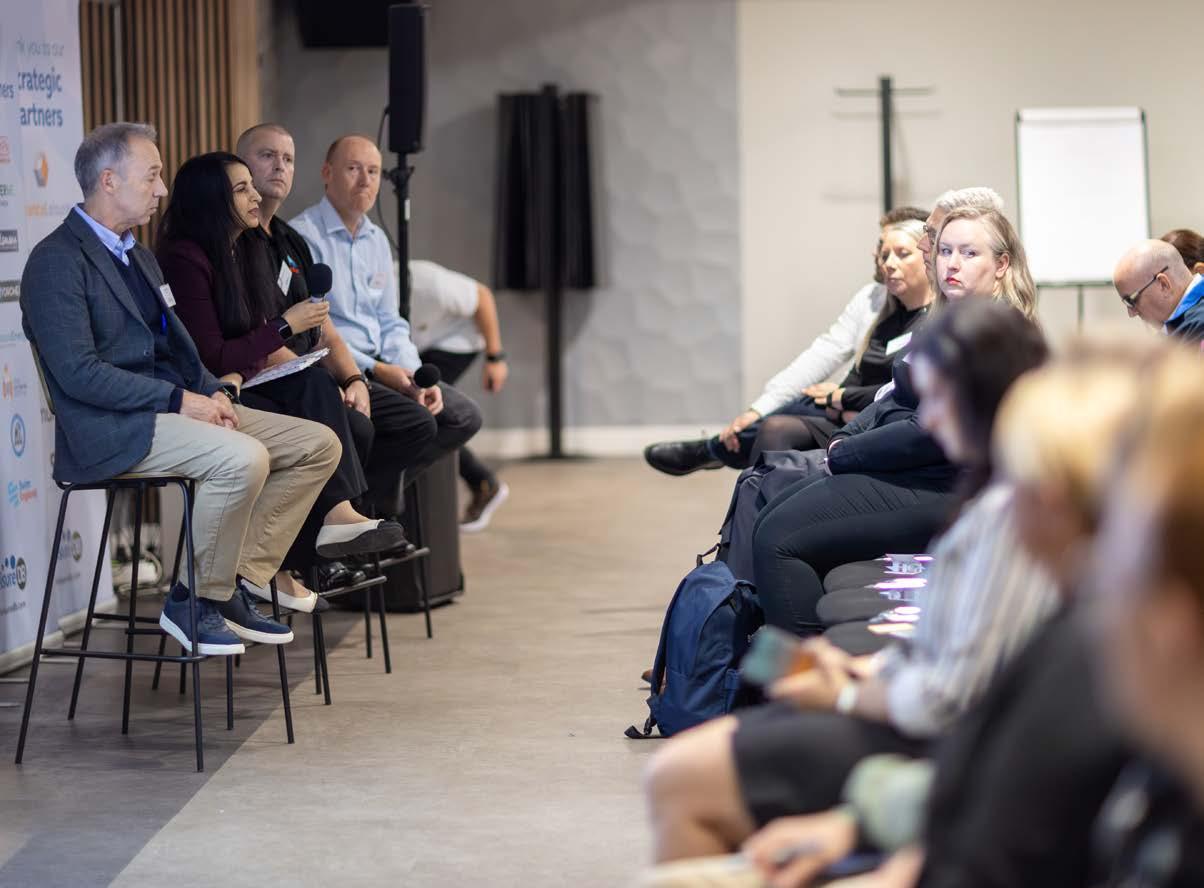


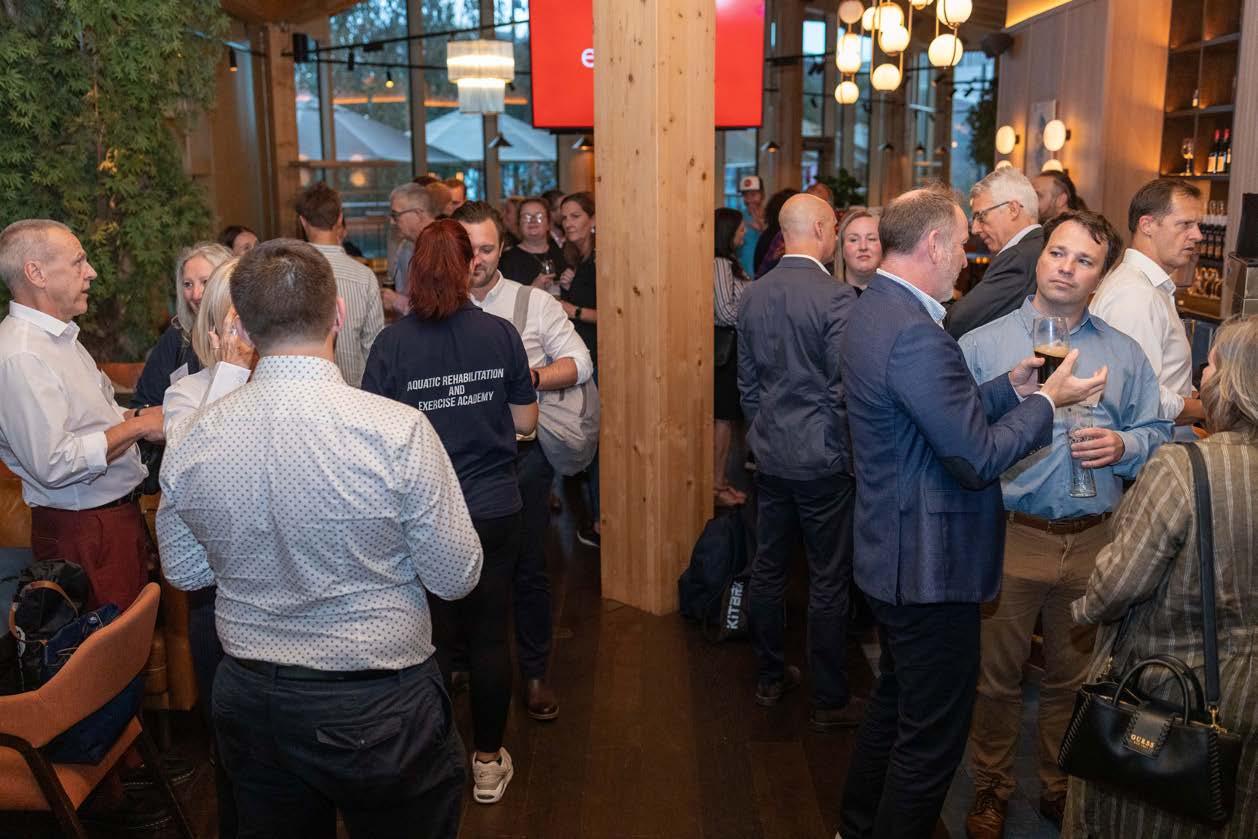


“A lifeguard doesn’t just watch swimmers, They assess risk, make split-second decisions and maintain authority while keeping an environment welcoming.” REBECCA COX
Swimming pools and leisure centres are great at nurturing the future workforce of the physical activity sector. WellNation ��nds out how a number of current sector leaders have made the jump from poolside to the boardroom
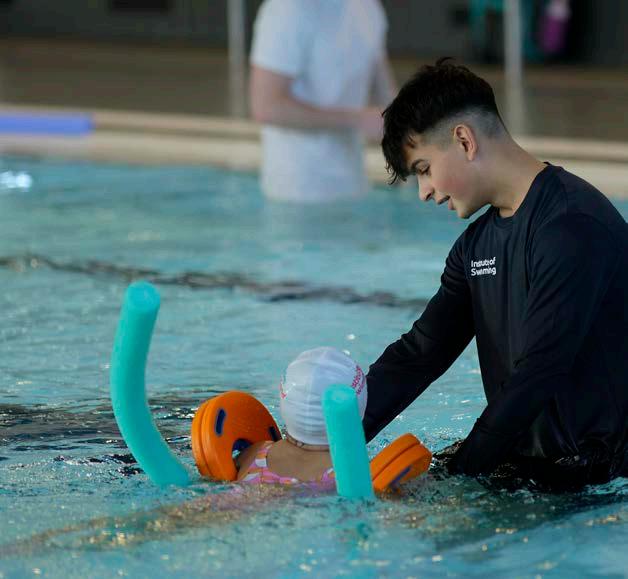
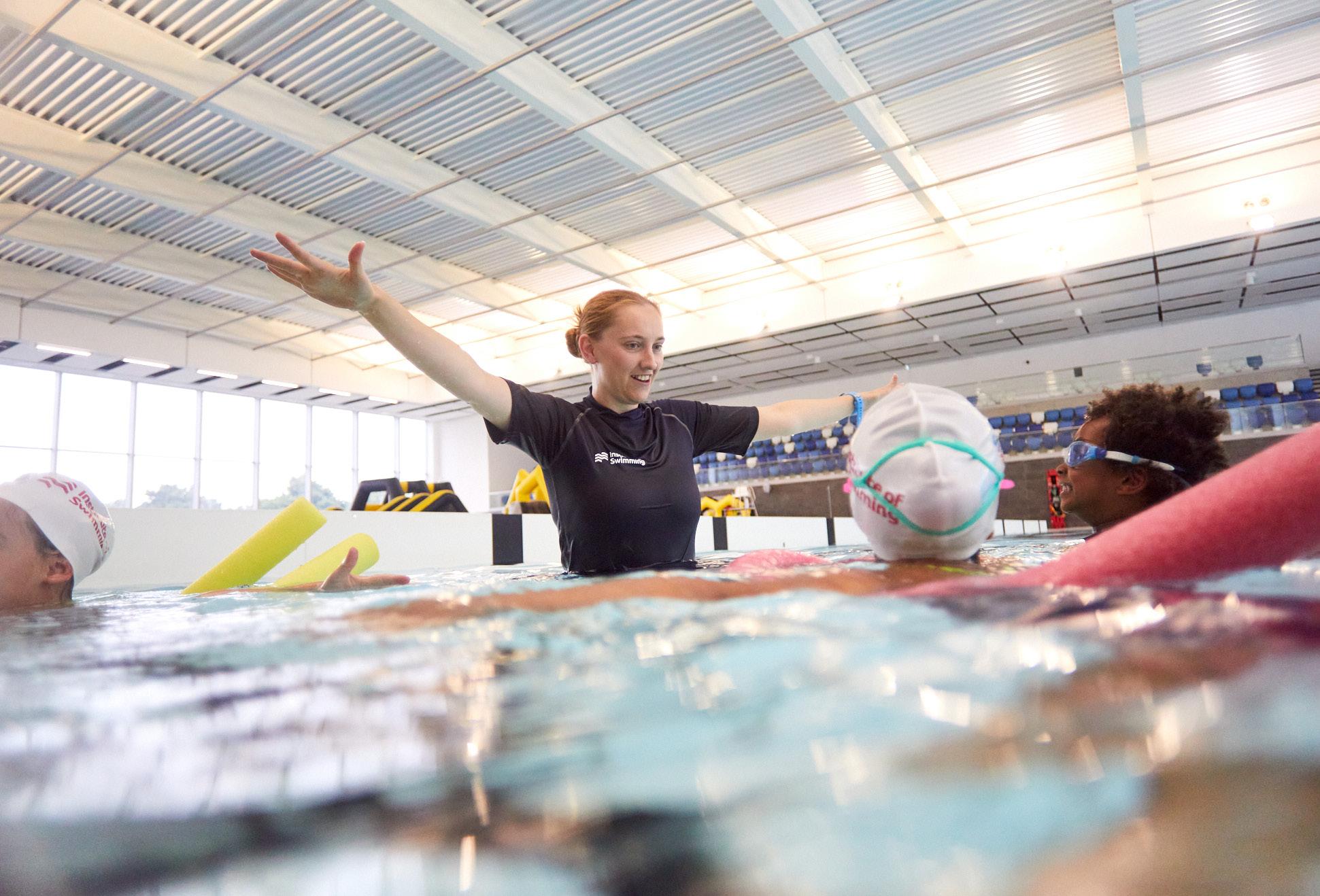

For some, the chlorine filled air of a swimming pool might seem an unlikely place to begin a career, but for thousands of people across the UK, it’s precisely where their professional journeys take shape. Lifeguard and swimming teacher roles serve as far more than summer or student jobs; they’re powerful stepping stones into careers.
Research from The Institute of Swimming (IOS) underscores this transformative impact, with its 2025 survey revealing an impressive 87% of swimming teachers aged 16-18 believing the role has boosted their confidence when applying for other jobs or educational opportunities. Even among the 19-25 age group, 82% report the same confidence-building effect – young professionals have discovered the skills learned poolside translate remarkably well when looking for employment within the leisure sector and beyond.
But what is it that makes aquatics such fertile training ground? According to Rebecca Cox, the Managing Director of Institute of Swimming, who

also started her career as a lifeguard and swimming teacher, the answer may lie in the unique combination of responsibility, communication and staying calm under pressure these roles demand. “A lifeguard doesn’t just watch swimmers,” Cox says. “They assess risk, make split-second decisions and maintain authority while keeping an environment welcoming.
“Swimming teachers develop aquatic skills, they adapt their communication style to different learning abilities, manage groups and build confidence in others, often while dealing with the pressure of parents watching from the sidelines. These entry level jobs in aquatics require a level of responsibility and interpersonal skills that create a professional maturity employers, regardless of sector, recognise and value.”
In an economy hungry for confident, capable young professionals, our pools and leisure centres aren’t just keeping communities active, they’re quietly nurturing the workforce of tomorrow. For young people ready to dive into their future, there’s no shallow end to the opportunities that await.
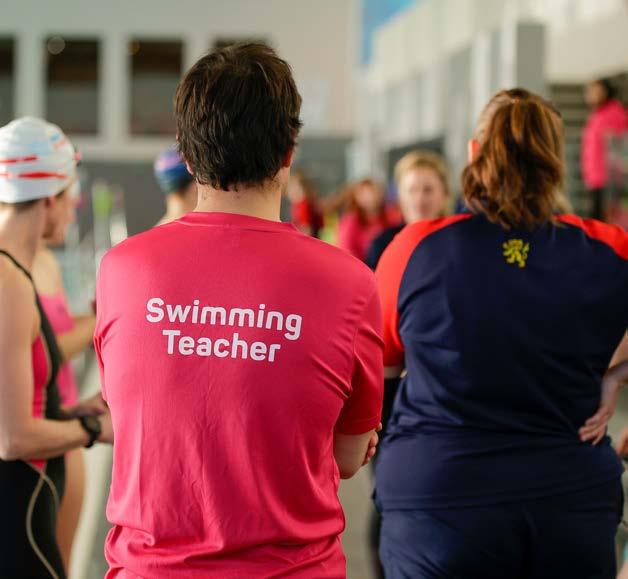
The path from pool to long-term, high-level career is well-trodden, as these well-known industry names demonstrate.
Tara Dillon CEO CIMSPA
Dillon trained as a lifeguard 39 years ago while studying for her A Levels and started working at the Oasis Leisure Centre in Swindon. She says: “I absolutely loved it! I enjoyed working in a team and having some money in my back pocket, so when I was offered further training to become a swimming teacher and a fitness instructor I jumped at the chance. I was picking up so many hours I didn’t go to university in the end. I didn’t need to. I had the world at my feet.
“Even today, there are skills I learnt back as a teenager that I use every day. Aquatics is such a perfect entry point into a working life, both in our sector and beyond. Being a lifeguard or swimming teacher gives you a head start, it gives you ‘Life 101’, the skills that can’t be
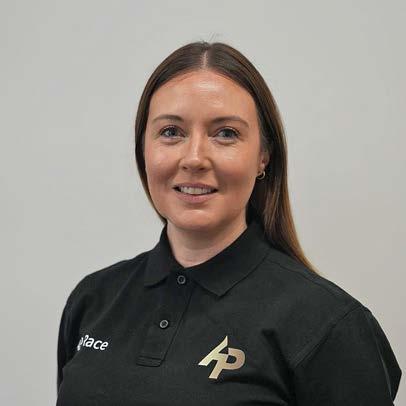
There’s so much you can do with a career that starts in aquatics, both within and outside the sector
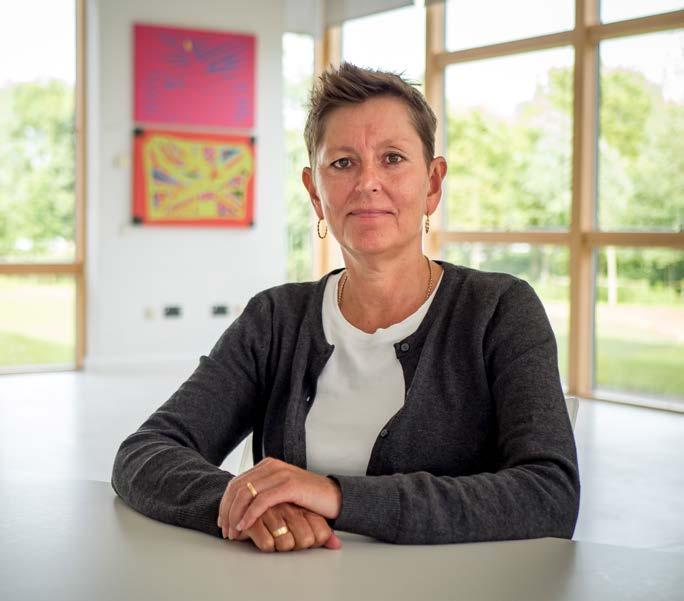
taught in school or from a book. I know if I meet someone that started work in aquatics they will be a good team player, that they can communicate, they are adaptable and they are calm under pressure. How many careers require those skills? I’d say all of them. Due to my grounding and where my career started it’s now my life’s work to ensure the leisure sector supports and develops its workforce, continually providing opportunities to ensure our people are the experts society needs.”
Katie Towner Director of Operations AP RACE
NIt gives you ‘Life 101’, the skills that can’t be taught in school or from a book
ow the Director of Operations for AP Race, Katie’s professional journey started with summer shifts at her local pool.
“I guess you could say I wasn’t really academic. I lacked direction and despite starting AS and A Levels, it didn’t feel like the right fit,” she explains. “I hated my part-time job in a department store, so when I saw my local leisure centre was looking for lifeguards I begged my dad to pay for the training. I loved the buzz and the atmosphere of being at a leisure centre, it was so much more interesting than selling old ladies’ clothes!
“I started working at the pool more and more and really enjoyed how being a lifeguard gave me opportunities to help other departments – whether that was reception or supporting duty managers. So when tmactive offered to fund my Institute of Swimming training to gain my Swim England teaching qualifications I jumped at the chance. I realised I wasn’t going back to college and didn’t have aspirations to go to university. All this time I had been looking for my future, but I had already found my career destiny.”
Katie’s career soon took off; from lifeguard to swimming teacher, then assistant aquatics officer to working as Head of Learn to Swim at Swim England and now AP Race. She says: “There’s so much you can do with a career that starts in aquatics, both within and outside the sector. I can still see the skills I learnt as a teenager in the work I do now. Being a lifeguard or swimming teacher as a young person gives you confidence – in your own ability, to speak to people, and to think quickly on your feet.”
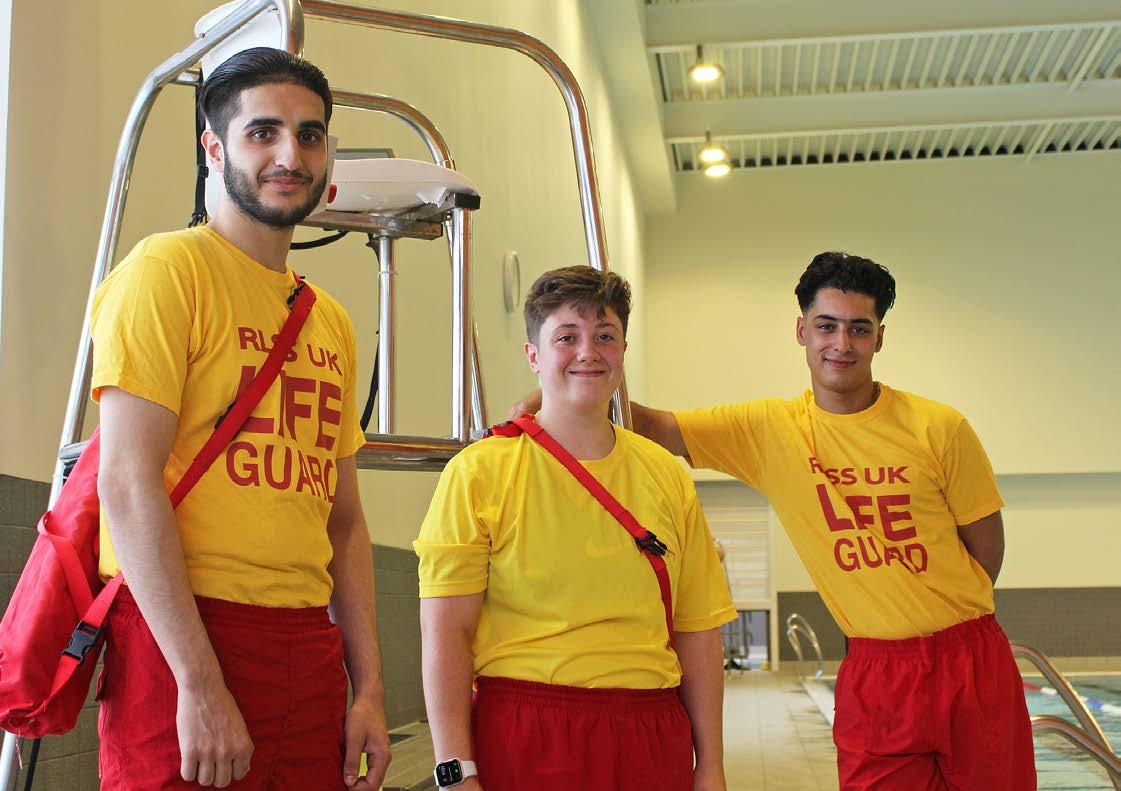
Hannah Smith
National Aquatic Business Manager FREEDOM LEISURE
“Istarted volunteering at my swimming club when I was 11, helping the younger children develop their skills. I loved it, and when I was 16 I gained my formal swimming teacher and lifeguard qualifications and immediately began paid employment while studying for my A Levels.
Working at the pool always felt like a safe and welcoming environment, so when I went to university it was comforting to be able to pick up aquatics work there too and still teach swimming back home during weekends and holidays.”
Working in aquatics means Hannah has never stopped learning:
“Every role has been a stepping stone to my next challenge. At just 20 I became the youngest Swim England tutor in the country at the time, teaching the next generation of swimming teachers. As a tutor, the small teaching groups are brilliant because you can really support people.
“I learned so much in that role, especially that not everyone learns or solves problems the same way. I could be teaching anyone from 16-yearolds right through to people in their seventies and beyond. Neurodiverse learners and practical learners too. Many of our most successful instructors are neurodiverse and bring that different perspective to their teaching.
“Being a tutor gave me tremendous confidence. Despite being shy as a child, I have no problem speaking to large crowds. But I think the most striking aspect of my career journey is how early engagement provided such significant advantages. By the time I graduated from university at 21, I already had almost a decade’s experience in teaching and tutoring. I had gained tremendous confidence and built valuable industry connections that would serve me throughout my career. It’s shaped who I am today and I couldn’t recommend it more highly as a career path.”
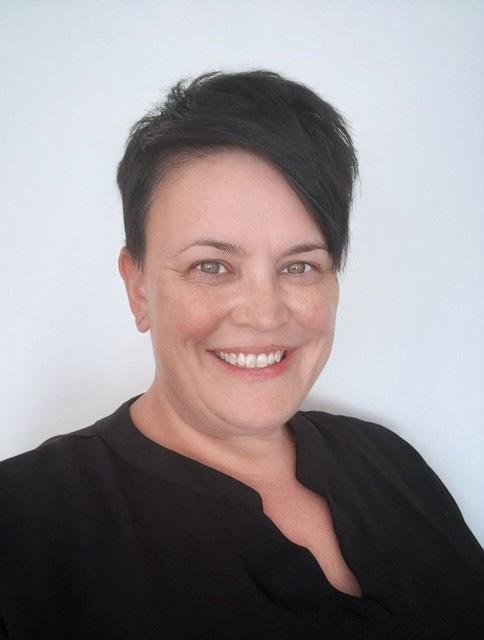
It’s shaped who I am today and I couldn’t recommend it more highly as a career path
All you need to bring is an open mind and willingness
Steve May CEO
MYTIME ACTIVE
Steve May’s recent appointment as CEO of Mytime Active saw his career come full circle, from teenage lifeguard at Mytime Active’s Walnuts Leisure Centre to leading the entire charitable organisation.
May says: “I loved being a lifeguard, it was great to work in such a safe space and earn money. It felt very grown up. Although I was interested in sport as a young person, I had no idea that my teenage weekend job would ultimately kick start my career. I still enjoy being poolside and checking in with our lifeguards.
“The leisure industry has always been accessible; there are few barriers to entry. We’ll train you and provide everything you need to do the job. All you need to bring is an open mind and willingness and we can develop internal pathways to progress you to a duty manager, an operations manager or even a chief executive, just as I’ve done.
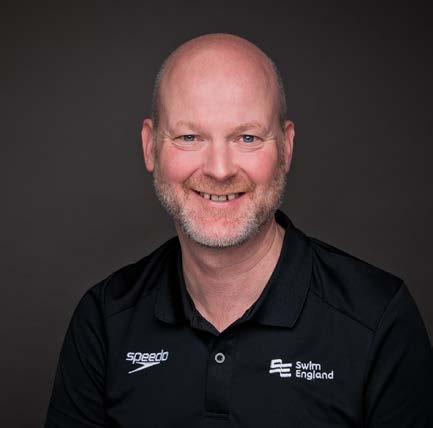
It’s a big responsibility for anyone, especially as a teenager
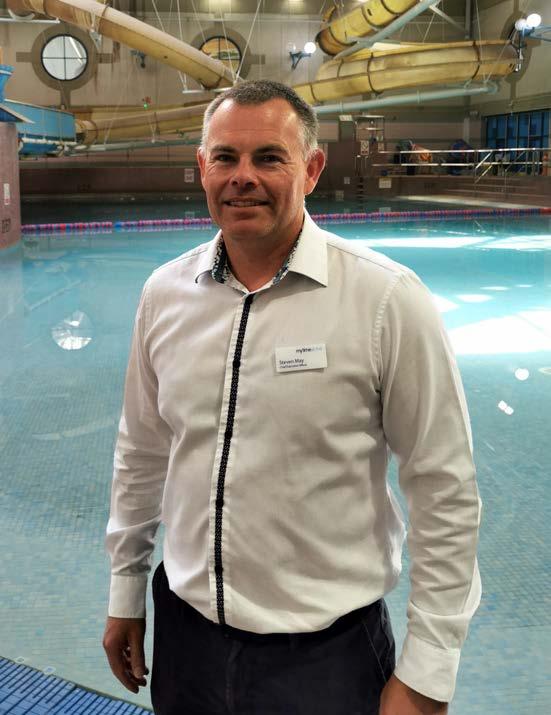
“But many people begin as lifeguards or swimming teachers before changing tack and following careers into roles such as paramedics, firefighters or police officers. Rather than seeing this as a loss, we should embrace our role in this ecosystem. Ultimately, the leisure sector is fantastic at supporting professional development, providing valuable life skills that benefit people whether they remain in leisure or move to other sectors. Working in aquatics creates futures.”
Ally Whike Sport Development Director SWIM ENGLAND
Ally’s career includes previous roles as the Director of Aquatics and the Performance Director at Scottish Swimming. However, he first trained to become a swimming teacher when he was just 16, whilst studying for exams at his high school.
He says: “I did my training as soon as I could. I didn’t think of it as the launchpad for my career; it was just that I loved to swim and enjoyed helping people, it was the right place for me to be.
“The pool isn’t what a teenager would typically imagine as a workplace, but you’re learning lots about how to interact, engage and communicate
with people, adjusting your style to make sure people understand you. You learn quite a lot of life lessons while teaching swimming, like patience and dealing with the person who’s in front of you, because all kids are different. It’s a big responsibility for anyone, especially as a teenager.
“Yes, being a swimming teacher as a teen pays good money and offers good hours, but what’s really important is embracing the moment of helping someone achieve something. It offers so many pathways to success too. Obviously within the sector, but also as the foundation for lots of other careers. The skills you learn as a swimming teacher underpin everything you do, especially when you work to develop people, regardless of the industry.”



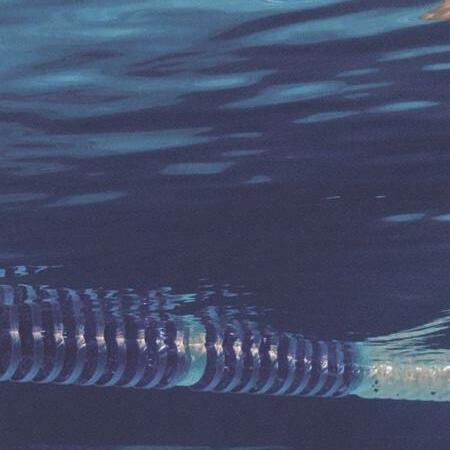
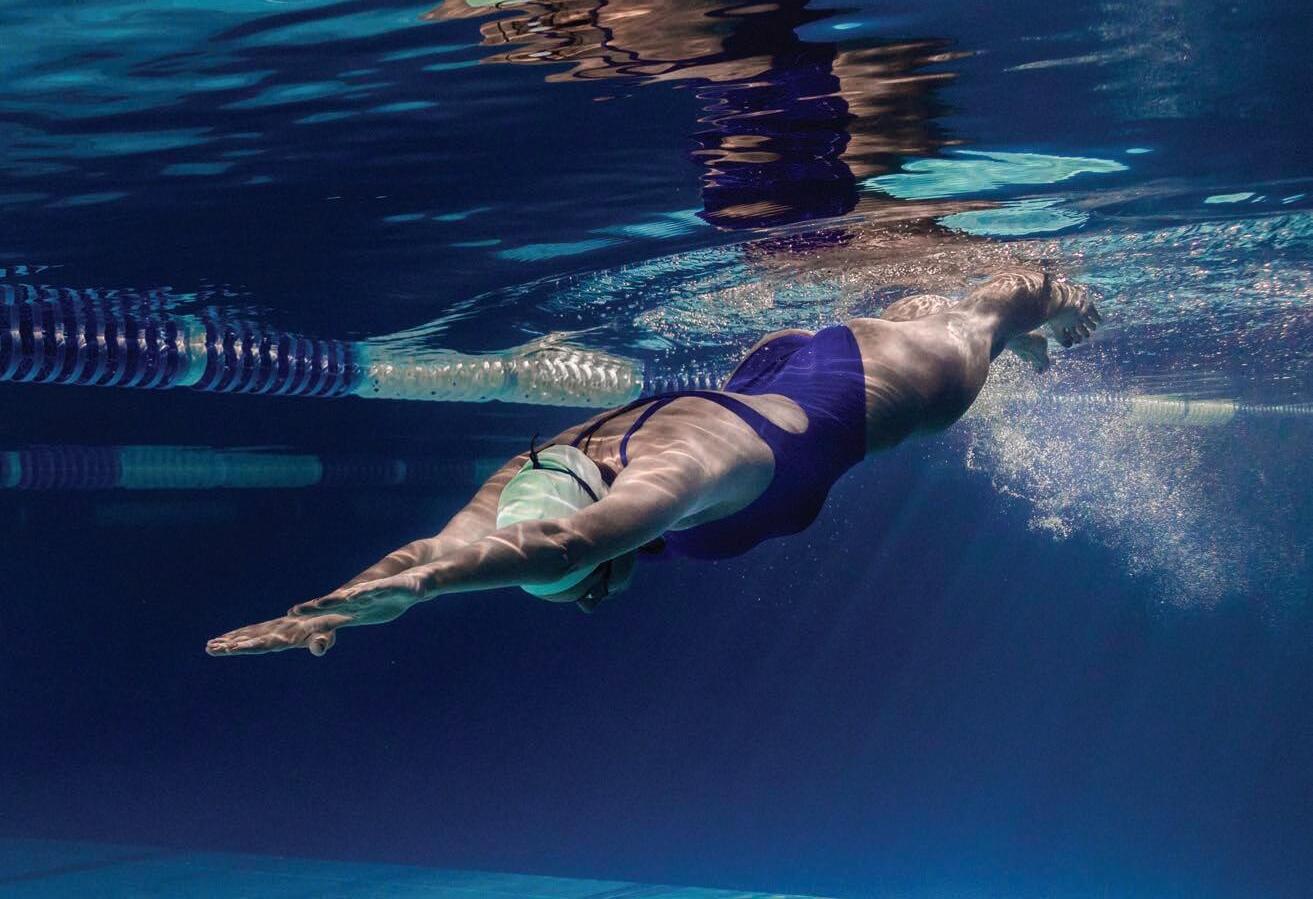

SPATEX represents all sectors of the water leisure industry from pools, spas, saunas to hydrotherapy, steam rooms and play equipment, in both the domestic and commercial arena.


